Manuscripts and Letters of Oscar Wilde
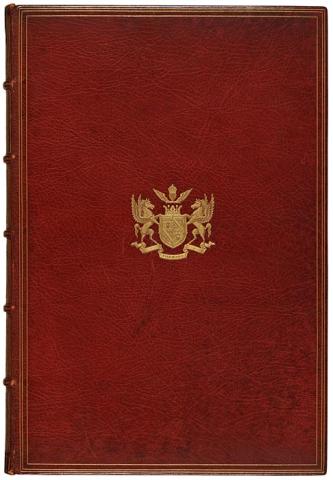
In fall 2008, The Morgan Library & Museum received the gift of a highly important bound collection of Oscar Wilde's letters and manuscripts, the whereabouts of which has been unknown to scholars for over half a century. This digital facsimile provides images and transcriptions of all the items housed in the volume.
The red-leather-bound volume, totaling just over fifty handwritten pages, comprises nine manuscripts of poems and prose pieces and four important letters that illuminate the life and work of the celebrated writer, dramatist, aesthete, wit, and self-proclaimed "lord of language." Of special note are the earliest surviving letter from Wilde to his lover Lord Alfred Douglas (called "Bosie,"); a manuscript of the story "The Selfish Giant" in the hand of Wilde's wife, Constance; the only surviving autograph manuscripts of Wilde's Poems in Prose; and a letter in which Wilde reiterated his famous claim that art is "useless."
The volume is the gift of Lucia Moreira Salles, a Brazilian-born philanthropist who acquired the manuscripts with her late husband, Walter Moreira Salles, a Brazilian banker, diplomat, and book collector. It joins the Morgan's fine collection of Wilde material, which includes the earliest manuscript of The Picture of Dorian Gray and the only surviving letter from Wilde to his wife, Constance.
A highlight of the volume is the earliest surviving letter documenting the start of one of the most famous and tragic intimate relationships of all time—between Wilde and Lord Alfred Douglas, the Magdalen College undergraduate with whom Wilde became passionately involved in the early 1890s. Writing on stationery of the Albemarle Club, probably in late 1892, Wilde expresses candid yearning to be with Douglas ("I should awfully like to go away with you") and hopes that Douglas likes the visiting-card case he has given him, perhaps for Douglas's twenty-second birthday. Douglas later destroyed many of the letters Wilde wrote to him. (Virtually all those he retained are now in the Clark Library at UCLA.)
The volume has both a distinguished and intriguing provenance. It was Douglas's father, the ninth marquess of Queensberry, whose rage at his son's involvement with Wilde led to one of the most notorious criminal trials of all time, resulting in Wilde's conviction on charges that he had committed acts of "gross indecency." It is therefore striking to find, on the cover of the volume, stamped in gilt, the arms of the marquess of Queensberry—the shield flanked by two winged horses over the motto Forward. The manuscripts and letters housed in the volume were collected and preserved by the eleventh marquess of Queensberry, the grandson of the man who played a major role in instigating Wilde's downfall.
In another letter in the volume, written to a young man named George Kersley, Wilde captured the intergenerational appeal of his 1888 collection of stories The Happy Prince and Other Tales, calling them "studies in prose, put for Romance's sake into a fanciful form: meant partly for children, and partly for those who have kept the childlike faculties of wonder and joy."
Though none of Wilde's own manuscripts for the tales in The Happy Prince survive, the volume contains an intriguing manuscript of one of the stories—"The Selfish Giant"—in the handwriting of Constance Wilde, who also had been writing some children's stories at this time. Oscar Wilde wrote the title and his own name on a cover sheet and signed the manuscript at the end, and he made small changes in pencil within the text penned by his wife. Additional, more substantive changes were made to the text before publication, indicating that the manuscript is an early draft—but by whom? Does the existence of an early version of the text in Constance Wilde's hand indicate that she had a role in the composition of the story? This manuscript invites speculation about the authorship of one of Wilde's best-known prose works.
Wilde's conviction that works of art ought to exist for their own sake is expressed dramatically in an 1891 letter to a young man, Bernulf Clegg. Wilde told him, "Art is useless because its aim is simply to create a mood. It is not meant to instruct, or to influence action in any way. . . . A work of art is useless as a flower is useless. A flower blossoms for its own joy. We gain a moment of joy by looking at it." This important letter, offering a concise expression of Wilde's artistic credo, is an extraordinary companion to one of the Morgan's greatest treasures, the manuscript of The Picture of Dorian Gray, Wilde's fictional exploration of this very idea.
The volume also contains several literary manuscripts that offer insight into Wilde's composition process. Included are working drafts of five of the six short compositions that Wilde called his Poems in Prose, heavily revised and several bearing ink smudges and compositors' marks that indicate that they were used by a printer. Wilde wrote these pieces in the mid-1890s in an effort to commit to paper some of the stories he had related to a range of listeners who had been dazzled by his verbal acuity.
The titles in manuscript are "The Doer of Good," "The Disciple," "The Master," "The House of Judgment," and "The Artist." Wilde wrote "The Doer of Good" at the height of his fame, with three successful plays running at once, but on the verge of his downfall. W.B. Yeats was impressed by its "terrible beauty" and recorded, in The Tragic Generation, that Wilde called it "the best story in the world" and would repeat it "to himself on getting out of bed and before every meal."
In a working draft of "La Dame Jaune," one of several poems in which Wilde explored the lyric possibilities of yellow—a color associated with decadence—Wilde described a woman removing her jewelry, letting down her hair, and loosening her clothes. He worked through various color possibilities—pale blue, rose pink, amber, and boxwood—before settling on "lemon yellow" and "ivory." The volume also includes manuscripts of "Roses and Rue," a poem Wilde composed for the actress Lillie Langtry, and "Under the Balcony," a poem written for a hospital fund-raiser and published on the day of his marriage to Constance Lloyd. It also contains a letter from Wilde to his publisher John Lane about the publication and American copyright of his play A Woman of No Importance.
Thumbnails
Binding
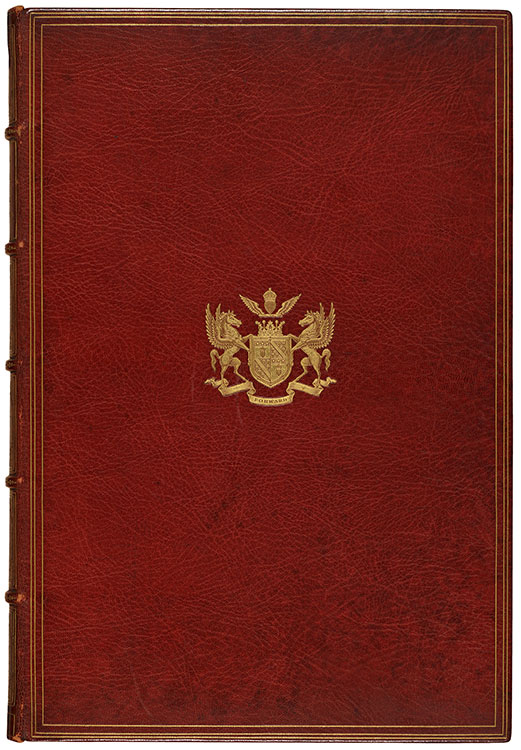
Cover of a volume of manuscripts and letters of Oscar Wilde, stamped in gilt with the Queensberry arms.
Gift of Lucia Moreira Salles, 2008
The volume has both a distinguished and intriguing provenance. It was Douglas's father, the ninth marquess of Queensberry, whose rage at his son's involvement with Wilde led to one of the most notorious criminal trials of all time, resulting in Wilde's conviction on charges that he had committed acts of "gross indecency." It is therefore striking to find, on the cover of the volume, stamped in gilt, the arms of the marquess of Queensberry—the shield flanked by two winged horses over the motto Forward. The manuscripts and letters housed in the volume were collected and preserved by the eleventh marquess of Queensberry, the grandson of the man who played a major role in instigating Wilde's downfall.
"Roses and Rue", page 1
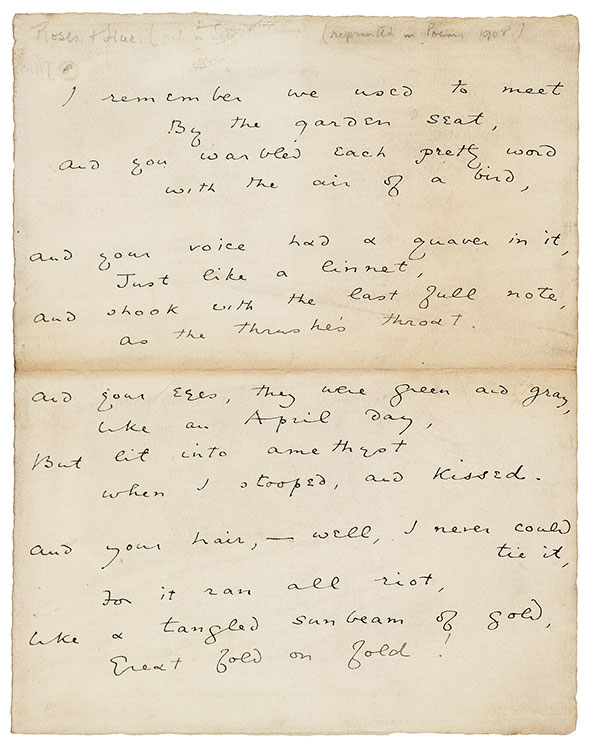
"Roses and Rue."
Autograph manuscript signed, ca. 1884–1885. 4 p.
Gift of Lucia Moreira Salles, 2008
Page 1
I remember we used to meet
By the1 garden seat,
And you warbled each pretty word
With the air of a bird,
And your voice had a quaver in it,
Just like a linnet,
And shook with the last full note,
As the thrushe's2 throat.
And your eyes, they were green and gray,
Like an April day,
But lit into amethyst
When I stooped, and kissed.
And your hair, —well, I never could tie it,
For it ran all riot,
Like a tangled sunbeam of gold,
Great fold on3 fold!
1 For publication, "the" was changed to "a."
2 For publication, "thrushe's" was changed to "thrush's."
3 For publication, "on" was changed to "upon."
"Roses and Rue", page 2
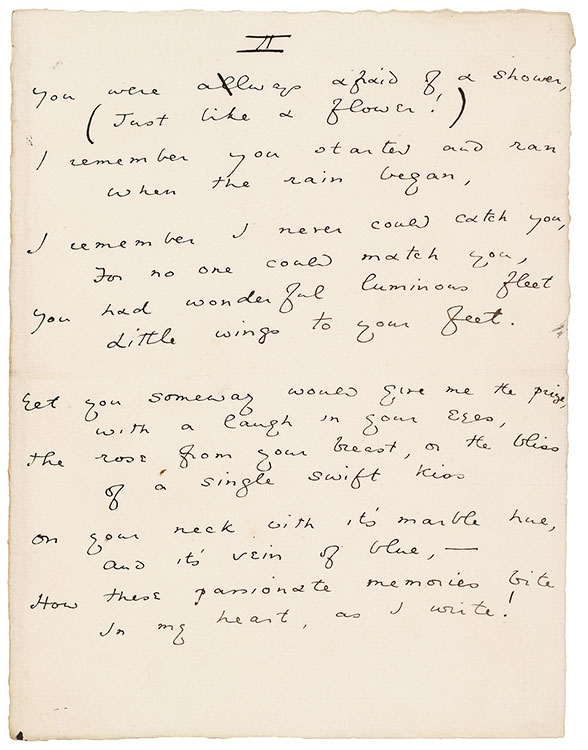
"Roses and Rue."
Autograph manuscript signed, ca. 1884–1885. 4 p.
Gift of Lucia Moreira Salles, 2008
Page 2
II
You were allways afraid of a shower
(Just like a flower!)
I remember you started and ran
When the rain began,
I remember I never could catch you
For no one could match you,
You had wonderful luminous fleet
Little wings to your feet.
Yet you someway4 would give me the prize,
With a laugh in your eyes,
The rose5 from your breast, or the bliss
Of a single swift kiss
On your neck with it's6 marble hue,
And it's vein of blue, —
How these passionate memories bite
In my heart, as I write!
4 For publication, "someway" was changed to "somehow."
5 For publication, a comma was added after "rose."
6 For publication, "it's" was changed to "its."
"Roses and Rue", page 3
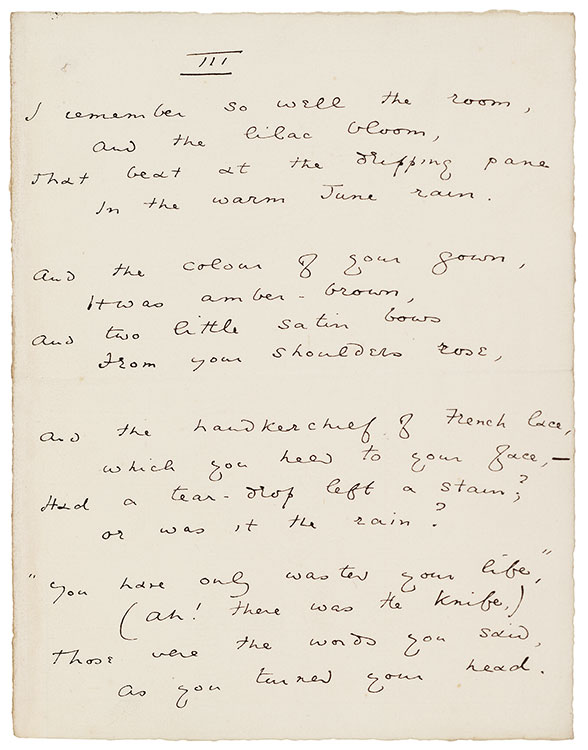
"Roses and Rue."
Autograph manuscript signed, ca. 1884–1885. 4 p.
Gift of Lucia Moreira Salles, 2008
Page 3
III
I remember so well the room,
And the lilac bloom,
That beat at the dripping pane
In the warm June rain.
And the colour of your gown,
It was amber-brown,
And two little satin bows
From your shoulders rose,
And the handkerchief of French lace,
Which you held to your face, —
Had a tear-drop left a stain?
Or was it the rain?
"You have only wasted your life,"
(Ah! there was the knife,)
Those were the words you said,
As you turned your head.
"Roses and Rue", page 4
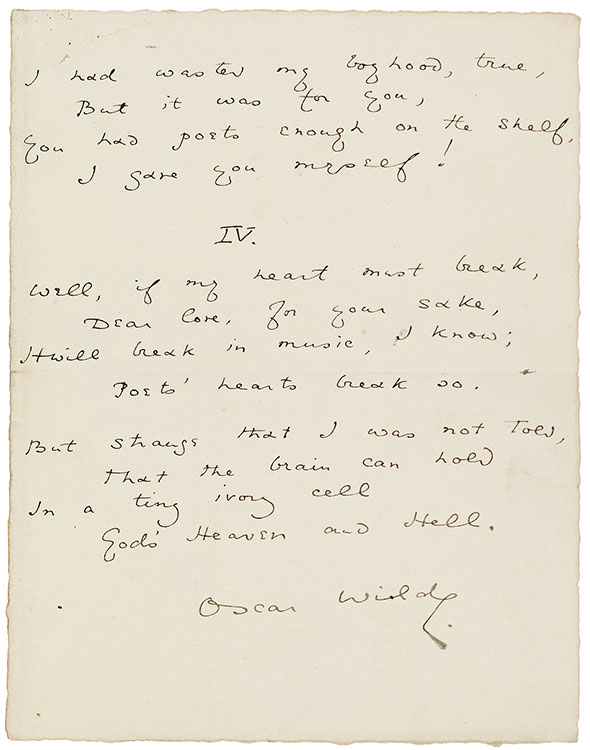
"Roses and Rue."
Autograph manuscript signed, ca. 1884–1885. 4 p.
Gift of Lucia Moreira Salles, 2008
Page 4
I had wasted my boyhood, true,
But it was for you,
You had poets enough on the shelf,
I gave you myself!
IV.
Well, if my heart must break,
Dear love, for your sake,
It will break in music, I know;
Poets' hearts break so.
But strange that I was not told,
That the brain can hold
In a tiny ivory cell
God's Heaven and Hell.
Oscar Wilde
"The House of Judgment", page 1
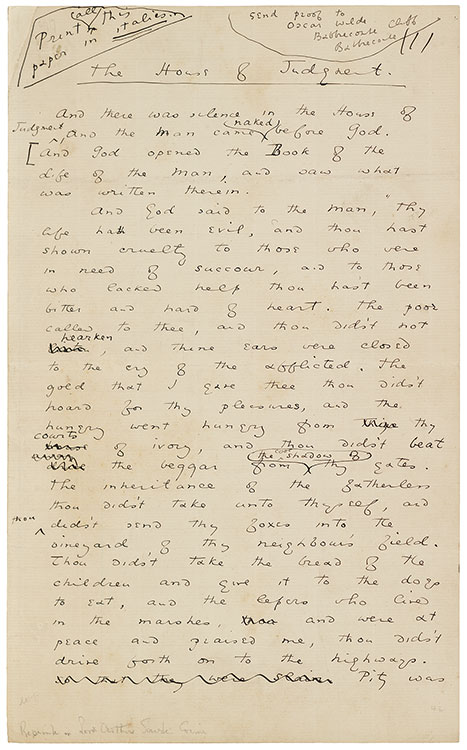
"The House of Judgment," from Poems in Prose
Autograph manuscript signed, ca. 1893. 6 p.
Gift of Lucia Moreira Salles, 2008
Page 1
Print all this paper in italics.
Send proof to Oscar Wilde
Babbecombe [i.e., Babbacombe] Cliff
Babbecombe
The House of Judgment.
And there was silence in the House of Judgment, and the Man came naked before God. [And God opened the Book of the Life of the Man, and saw what was written therein.
And God said to the Man, "thy life hath been evil, and thou hast shown cruelty to those who were in need of succour, and to those who lacked help thou has't been bitter and hard of heart. The poor called to thee, and thou dids't not listen hearken, and thine ears were closed to the cry of the afflicted. The gold that I gave thee thou dids't hoard for thy pleasures, and the hungry went hungry from thine thy house courts of ivory, and thou dids't beat away drive the beggar from the cool shadow of thy gates. The inheritance of the fatherless thou dids't take unto thyself, and thou dids't send thy foxes into the vineyard of thy neighbour's field. Thou dids't take the bread of the children and give it to the dogs to eat, and the lepers who lived in the marshes, thou and were at peace and praised me, thou dids't drive forth on to the highways. so that they were slain Pity was
"The House of Judgment", page 2
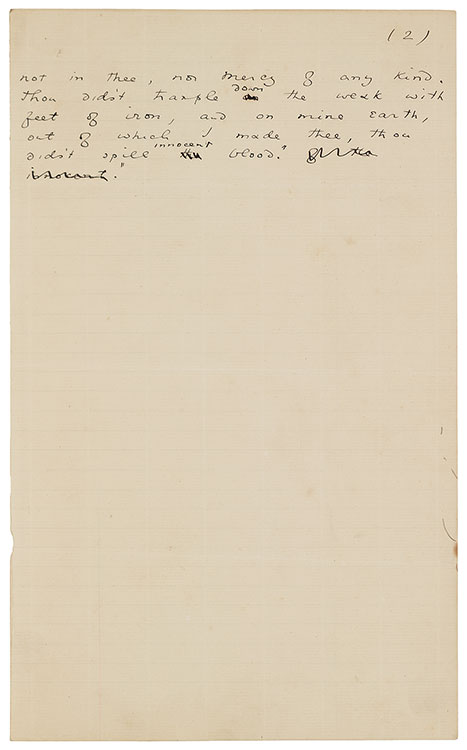
"The House of Judgment," from Poems in Prose
Autograph manuscript signed, ca. 1893. 6 p.
Gift of Lucia Moreira Salles, 2008
Page 2
(2)
not in thee, nor mercy of any kind, thou dids't trample on down the weak with feet of iron, and on mine earth, out of which I made thee, thou dids't spill the innocent blood." of the innocent."
"The House of Judgment", page 3
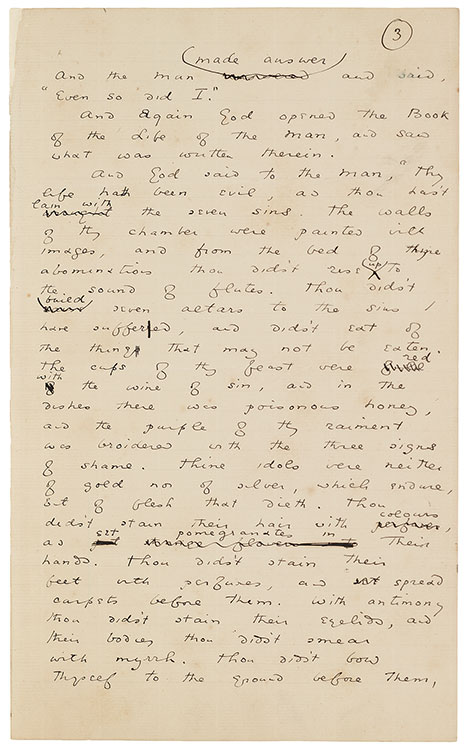
"The House of Judgment," from Poems in Prose
Autograph manuscript signed, ca. 1893. 6 p.
Gift of Lucia Moreira Salles, 2008
Page 3
(3)
And the Man answered made answer and said, "Even so did I."
And again God opened the Book of the Life of the Man, and saw what was written therein.
And God said to the Man, "Thy life hath been evil, as thou has't wrought lain with the seven sins. The walls of thy chamber were painted with images, and from the bed of thine abominations thou dids't rise up to the sound of flutes. Thou dids't raise build seven altars to the sins I have sufferred, and dids't eat of the things that may not be eaten. The cups of thy feast were full of red with the wine of sin, and in the dishes there was poisonous honey, and the purple of thy raiment was broidered with the three signs of shame. Thine idols were neither of gold nor of silver, which endure, but of flesh that dieth. Thou dids't stain their hair with perfumes, colours a[n]d put strange flowers into set pomegranates in their hands. Thou dids't stain their feet with perfumes, and set spread carpets before them. With antimony thou dids't stain their eyelids, and their bodies thou dids't smear with myrrh. Thou dids't bow thyself to the ground before them,
"The House of Judgment", page 4
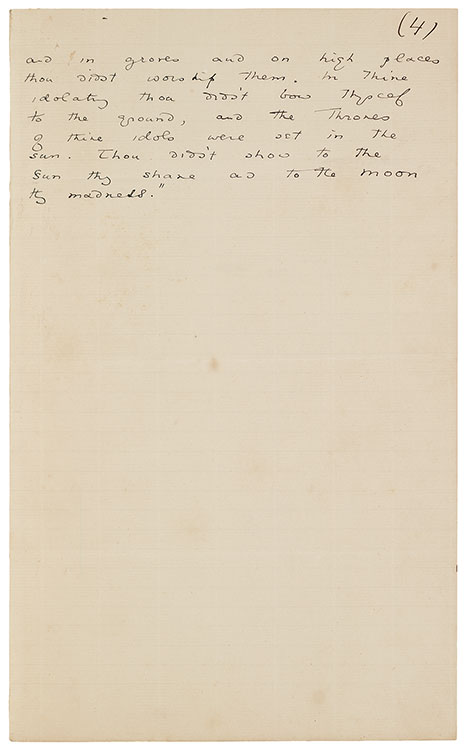
"The House of Judgment," from Poems in Prose
Autograph manuscript signed, ca. 1893. 6 p.
Gift of Lucia Moreira Salles, 2008
Page 4
(4)
and in groves and on high places thou didst worship them. In thine idolatry thou dids't bow thyself to the ground, and the thrones of thine idols were set in the sun. Thou dids't show to the sun thy shame and to the moon thy madness."
"The House of Judgment", page 5
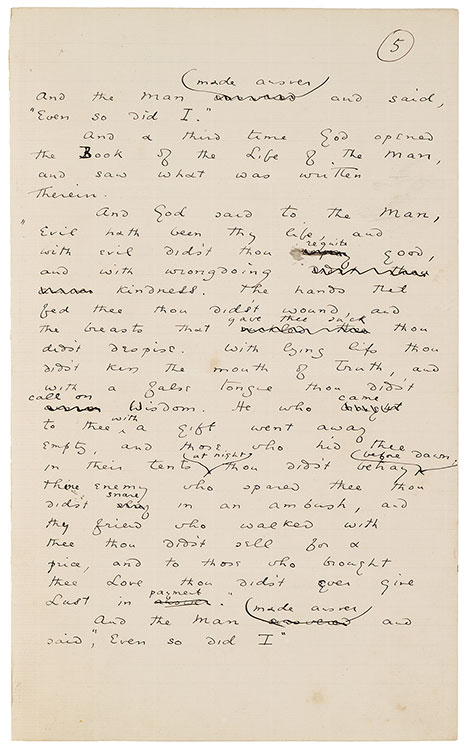
"The House of Judgment," from Poems in Prose
Autograph manuscript signed, ca. 1893. 6 p.
Gift of Lucia Moreira Salles, 2008
Page 5
(5)
And the mad answered made answer and said, "Even so did I."
And a third time God opened the Book of the Life of the Man, and saw what was written therein.
And God said to the Man, "Evil hath been thy life, and with evil dids't thou repay requite good, and with wrongdoing dids't thou answer kindness. The hands that fed thee thou dids't wound, and the breasts that suckled thee gave thee suck thou dids't despise. With lying lips thou dids't kiss the mouth of truth, and with a false tongue thou dids't answer call on Wisdom. He who brought came to thee with a gift went away empty, and those who hid thee in their tents at night thou dids't betray before dawn. Thine enemy who spared thee thou dids't slay snare in an ambush, and thy friend who walked with thee thou dids't sell for a price, and to those who brought thee Love thou dids't ever give Lust in answer payment."
And the Man answered made answer and said, "Even so did I."
"The House of Judgment", page 6
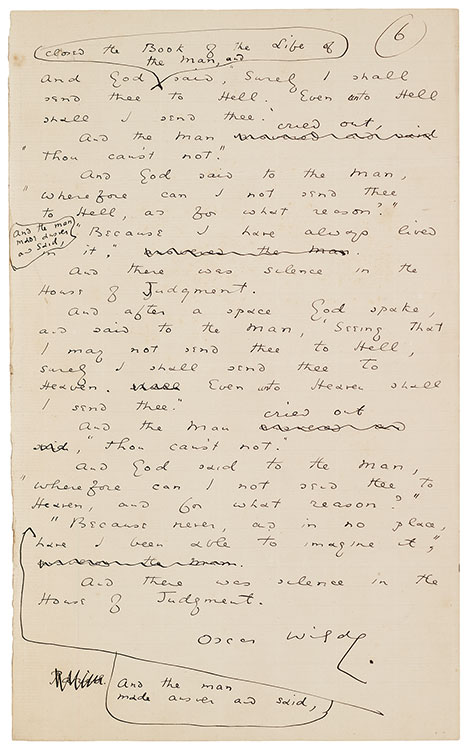
"The House of Judgment," from Poems in Prose
Autograph manuscript signed, ca. 1893. 6 p.
Gift of Lucia Moreira Salles, 2008
Page 6
(6)
And God closed the Book of the Life of the Man, and said, "Surely I shall send thee to Hell. Even unto Hell shall I send thee."
And the Man answered and said cried out, "Thou cans't not."
And God said to the Man, "Wherefore can I not send thee to Hell, and for what reason?"
And the Man made answer, and said, "Because I have always lived in it." answered the Man.
And there was silence in the House of Judgment.
And after a space God spake, and said to the Man, "Seeing that I may not send thee to Hell, surely I shall send thee to Heaven. Shall Even unto Heaven shall I send thee."
And the Man answered and said cried out, "Thou cans't not."
And God said to the Man, "Wherefore can I not send thee to Heaven, and for what reason?"
Parag. And the Man made answer and said, "Because never, and in no place, have I been able to imagine it." answered the Man.
And there was silence in the House of Judgment.
Oscar Wilde
Cover sheet for "Poems in Prose"
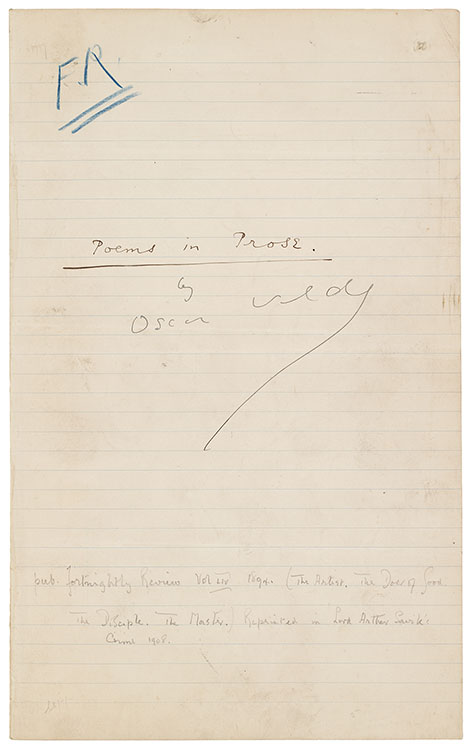
"The Artist," from Poems in Prose
Autograph manuscript, undated. 3 p., including cover sheet for Poems in Prose
Gift of Lucia Moreira Salles, 2008
Cover sheet
F.R. [Fortnightly Review]
Poems in Prose
by Oscar Wilde
[later note, in another hand, at bottom of page]
"The Artist", page 1
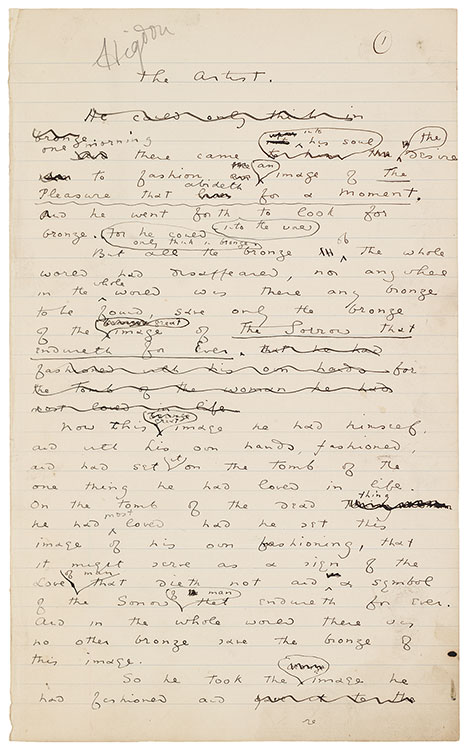
"The Artist," from Poems in Prose
Autograph manuscript, undated. 3 p., including cover sheet for Poems in Prose
Gift of Lucia Moreira Salles, 2008
Page 1
(1)
Higdon [typesetter's name]
The Artist.
He could only think in bronze.
And One morning there came to him into upon into his soul the a the desire idea to fashion an the an image of The Pleasure that lives abideth for a Moment. And he went forth into the world to look for bronze. For he could only think in bronze.
But all the bronze in of the whole world had disappeared, nor anywhere in the whole world was there any bronze to be found, save only the bronze of the bronze great image of The Sorrow that endureth for Ever. that he had fashioned with his own hands for the tomb of the woman he had most loved in life.
Now this bronze great image he had himself, and with his own hands, fashioned, and had set it on the tomb of the one thing he had loved in life. On the tomb of the dead thing woman thing he had most loved had he set this image of his own fashioning, that it might serve as a sign of the Love of man that dieth not and as a symbol of the sorrow of the man that endureth for ever. And in the whole world there was no other bronze save the bronze of this image.
So he took the bronze image he had fashioned and gave it to the
"The Artist", page 2
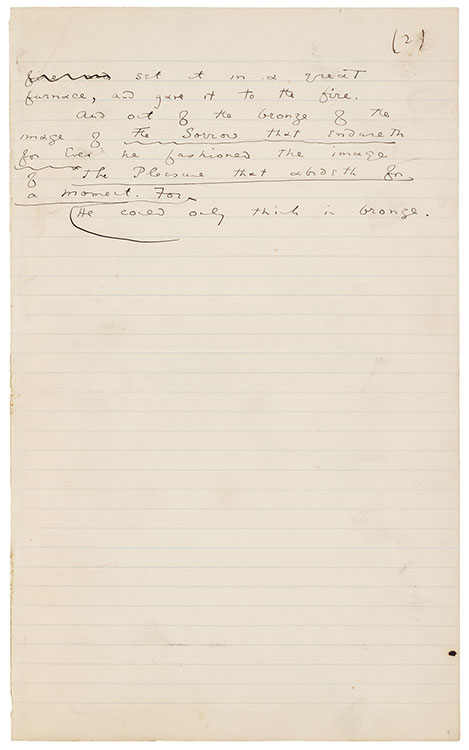
"The Artist," from Poems in Prose
Autograph manuscript, undated. 3 p., including cover sheet for Poems in Prose
Gift of Lucia Moreira Salles, 2008
Page 2
(2)
fire and set it in a great furnace, and gave it to the fire.
And out of the bronze of the image of The Sorrow that endureth for Ever he fashioned the image of The Pleasure that abideth for a Moment. For he could only think in bronze.
"The Doer of Good", page 1
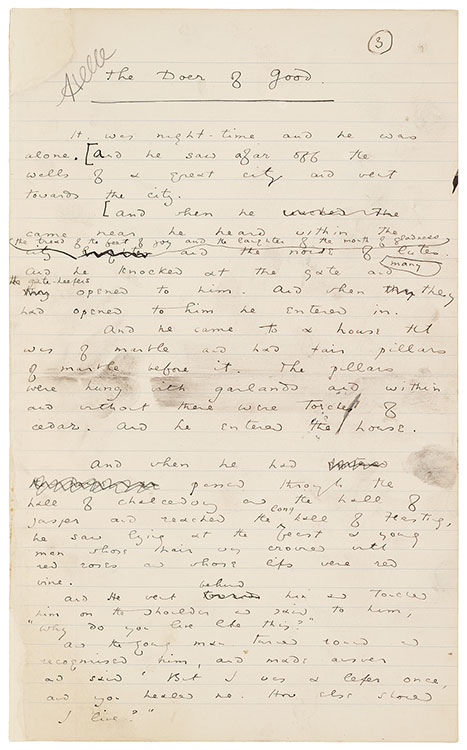
"The Doer of Good," from Poems in Prose
Autograph manuscript, undated. 3 p.
Gift of Lucia Moreira Salles, 2008
Page 1
(3)
Helle [typesetter's name]
The Doer of Good.
It was night-time and he was alone. [And he saw afar off the walls of a great city and went towards the city.
[And when he reached the came near he heard within the city laughter the tread of the feet of joy and the laughter of the mouth of gladness and the noise of lutes. And he knocked at the gate and many they the gate-keepers opened to him. And when they they had opened to him he entered in.
[And he came to a house that was of marble and had fair pillars of marble before it. The pillars were hung with garlands and within and without there were torches of cedar. And he entered the house.
And when he had entered the house passed through the hall of chalcedony and the hall of jasper and reached the long hall of Feasting, he saw lying at the feast a young man whose hair was crowned with red roses and whose lips were red wine.
And he went towards behind him and touched him on the shoulder and said to him, "Why do you live like this?"
And the young man turned round and recognised him, and made answer and said, "But I was a leper once, and you healed me. How else should I live?"
"The Doer of Good" page 2
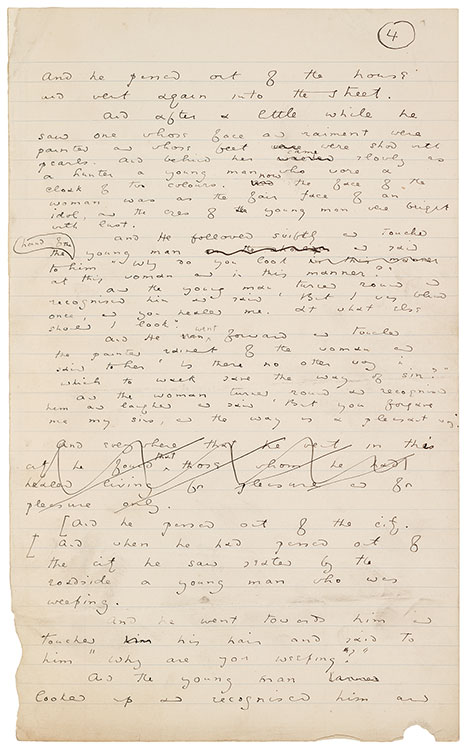
"The Doer of Good," from Poems in Prose
Autograph manuscript, undated. 3 p.
Gift of Lucia Moreira Salles, 2008
Page 2
(4)
And he passed out of the house and went again into the street.
And after a little while he saw one whose face and raiment were painted and whose feet were were shod with pearls. And behind her walked came slowly as a hunter a young man who wore a cloak of two colours. And Now the face of the woman was as the fair face of an idol, and the eyes of the young man were bright with lust.
And He followed swiftly and touched the hand of the young man on the shoulder and said to him "Why do you look in this manner at this woman and in this manner?"
And the young man turned round and recognised him and said, "But I was blind once, and you healed me. At what else should I look."
And He ran went forward and touched the painted raiment of the woman and said to her "Is there no other way in which to walk save the way of sin?"
And the woman turned round and recognised him and laughed and said "But you forgave me my sins, and the way is a pleasant way."
And everywhere that he went in this city he found that those whom he had healed living for pleasure and for pleasure only.
[And he passed out of the city.
[And when he had passed out of the city he saw seated by the roadside a young man who was weeping.
And he went towards him and touched him his hair and said to him "Whey are you weeping?"
And the young man turned looked up and recognised him and
"The Doer of Good", page 3
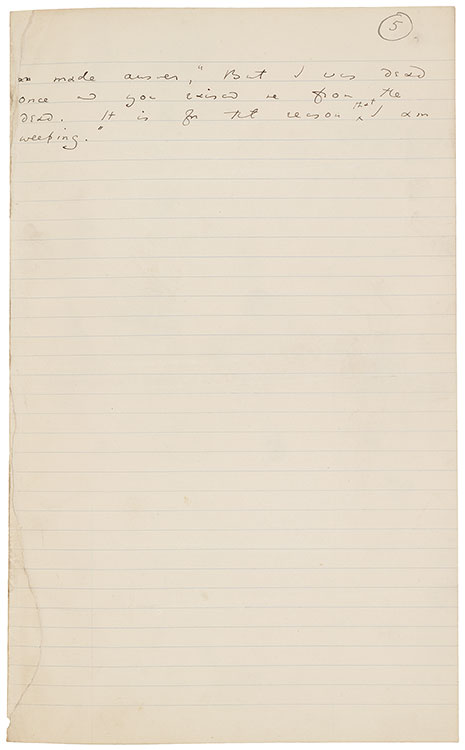
"The Doer of Good," from Poems in Prose
Autograph manuscript, undated. 3 p.
Gift of Lucia Moreira Salles, 2008
Page 3
(5)
an made answer, "But I was dead once and you raised me from the dead. It is for that reason that I am weeping."
"The Disciple", page 1
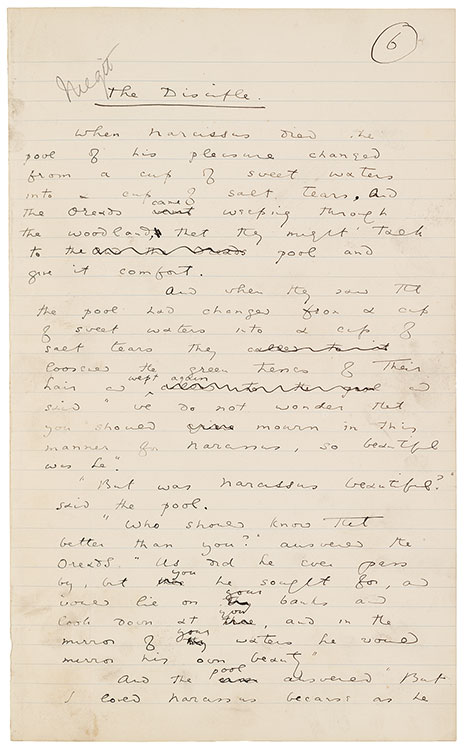
"The Disciple," from Poems in Prose
Autograph manuscript, ca. 1894. 2 p.
Gift of Lucia Moreira Salles, 2008
Page 1
(6)
Megit [typesetter's name]
The Disciple.
When Narcissus died the pool of his pleasure changed from a cup of sweet waters into a cup of salt tears. And the Oreads went came weeping through the woodlands, that they might talk to the And the Oreads pool and give it comfort.
And when they saw that the pool had changed from a cup of sweet waters into a cup of salt tears they called to it loosened the green tresses of their hair and wept again called to the pool and said "We do not wonder that you should grieve mourn in this manner for Narcissus, so beautiful was he."
"But was Narcissus beautiful?" said the pool.
"Who should know that better than you?" answered the Oreads. "Us did he ever pass by, but thee you he sought for, and would lie on thy your banks and look down at thee you, and in the mirror of thy your waters he would mirror his own beauty."
And the river pool answered "But I loved Narcissus because as he
"The Disciple", page 7
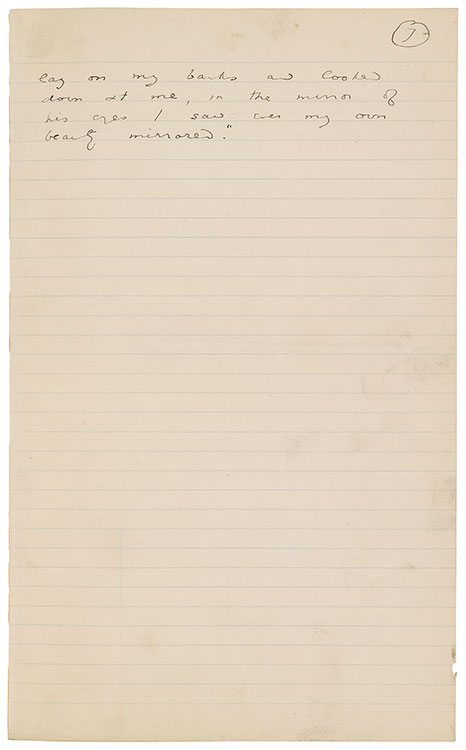
"The Disciple," from Poems in Prose
Autograph manuscript, ca. 1894. 2 p.
Gift of Lucia Moreira Salles, 2008
Page 7
(7)
lay on my banks and looked down at me, in the mirror of his eyes I saw ever my own beauty mirrored."
"The Master", page 1
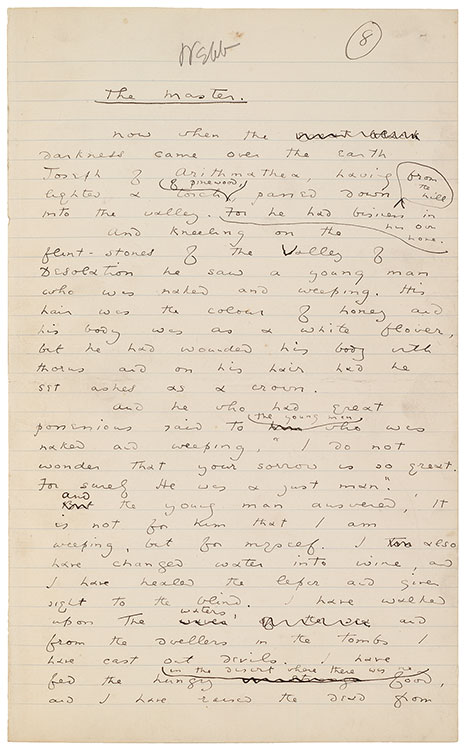
"The Master," from Poems in Prose
Autograph manuscript signed, undated. 2 p.
Gift of Lucia Moreira Salles, 2008
Page 1
(8)
Webb [typesetter's name]
The Master.
Now when the great black darkness came over the earth Joseph of Arithmathea, having lighted a torch of pinewood, passed down from the hill into the valley. For he had business in his own home.
And kneeling on the flint-stones of the Valley of Desolation he saw a young man who was naked and weeping. His hair was the colour of honey and his body was as a white flower, but he had wounded his body with thorns and on his hair had he set ashes as a crown.
And he who had great possessions said to him the young man who was naked and weeping, "I do not wonder that your sorrow is so great. For surely He was a just man."
But And the young man answered, "It is not for him that I am weeping, but for myself. I too also have changed water into wine, and I have healed the leper and given sight to the blind. I have walked upon the waves of the sea waters, and from the dwellers in the tombs I have cast out devils. I have fed the hungry on strange in the desert where there was no food, and I have raised the dead from
"The Master", page 2
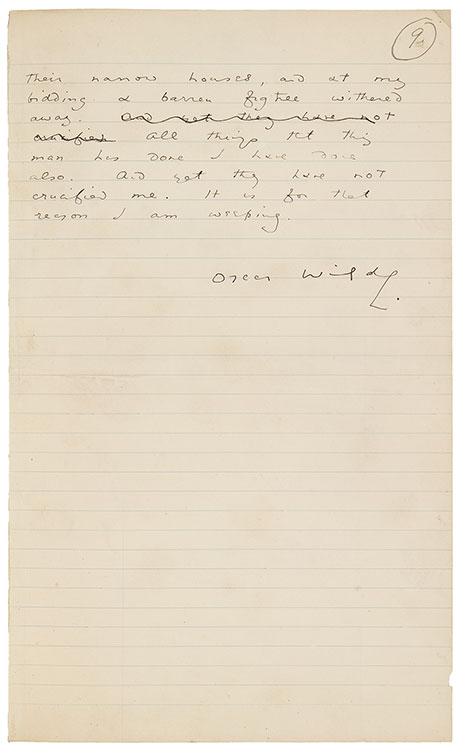
"The Master," from Poems in Prose
Autograph manuscript signed, undated. 2 p.
Gift of Lucia Moreira Salles, 2008
Page 2
(9)
their narrow houses, and at my bidding a barren fig tree withered away. And yet they have not crucified All things that this man has done I have done also. And yet they have not crucified me. It is for that reason I am weeping.
Oscar Wilde
"The Selfish Giant", page 1
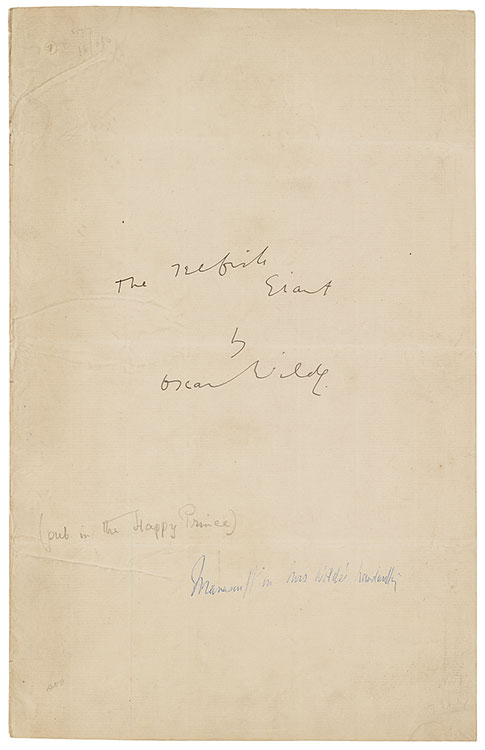
"The Selfish Giant."
Manuscript in the hand of Constance Wilde, signed by Oscar Wilde, ca. 1888. 8 p., including cover sheet
Gift of Lucia Moreira Salles, 2008
Page 1
The Selfish Giant
by
Oscar Wilde
[in another hand:] (publ. in The Happy Prince)
[in another hand:] Manuscript in Mrs Wilde's handwriting
"The Selfish Giant", page 2
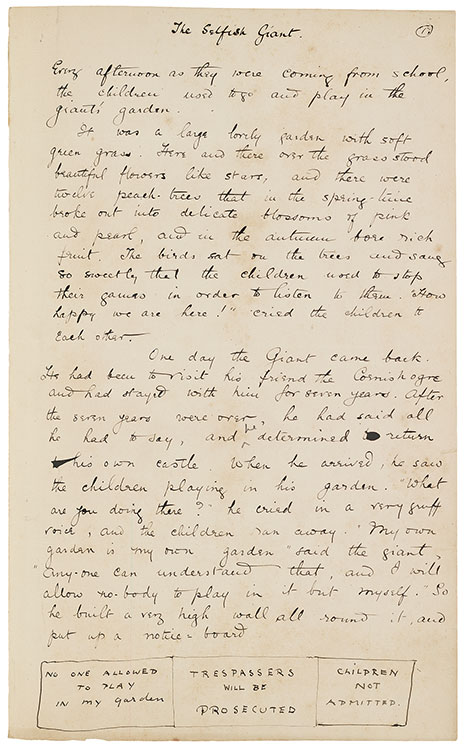
"The Selfish Giant."
Manuscript in the hand of Constance Wilde, signed by Oscar Wilde, ca. 1888. 8 p., including cover sheet
Gift of Lucia Moreira Salles, 2008
Page 2
(1)
The Selfish Giant
Every afternoon, as they were coming from school, the children used to go and play in the Giant's garden.
It was a large lovely garden, with soft green grass. Here and there over the grass stood beautiful flowers like stars, and there were twelve peach-trees that in the spring-time broke out into delicate blossoms of pink and pearl, and in the autumn bore rich fruit. The birds sat on the trees and sang so sweetly that the children used to stop their games in order to listen to them. "How happy we are here!" cried the children to each other.1
One day the Giant came back. He had been to visit his friend the Cornish ogre, and had stayed with him for seven years. After the seven years were over he had said all he had to say, 2 and he determined to return to his own castle. When he arrived he saw the children playing in the garden.
"What are you doing there3?" he cried in a very gruff voice, and the children ran away.
"My own garden is my own garden," said the Giant; "any one can understand that, and I will allow nobody to play in it but myself." So he built a high wall all round it, and put up a notice-board.
| NO ONE ALLOWED TO PLAY IN MY GARDEN |
TRESPASSERS WILL BE PROSECUTED |
CHILDREN NOT ADMITTED4 |
1For publication, "cried the children to each other" was changed to "they cried to each other."
2For publication, "all he had to say" was changed to "all that he had to say, for his conversation was limited."
3For publication, the word "there" was changed to "here."
4For publication, only the center notice was printed.
"The Selfish Giant", page 3
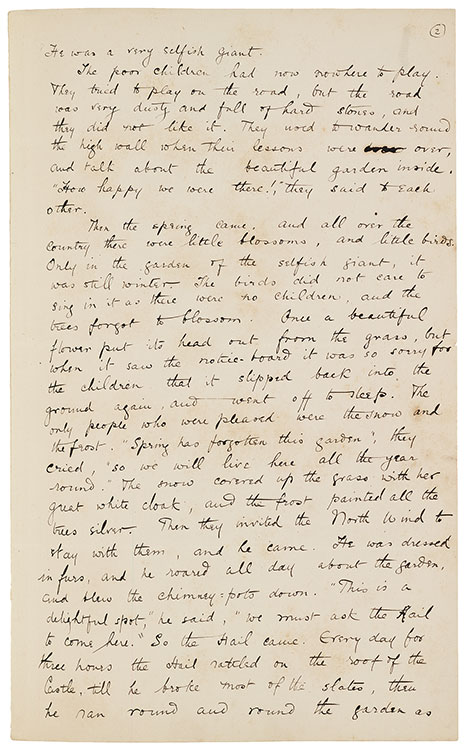
"The Selfish Giant."
Manuscript in the hand of Constance Wilde, signed by Oscar Wilde, ca. 1888. 8 p., including cover sheet
Gift of Lucia Moreira Salles, 2008
Page 3
(2)
He was a very selfish Giant.
The poor children had now nowhere to play. They tried to play on the road, but the road was very dusty and full of hard stones, and they did not like it. They used to wander round the high wall5 when their lessons were over, and talk about the beautiful garden inside. "How happy we were there!" they said to each other.
Then the Spring came, and all over the country there were little blossoms and little birds. Only in the garden of the Selfish Giant it was still winter. The birds did not care to sing in it as there were no children, and the trees forgot to blossom. Once a beautiful flower put its head out from the grass, but when it saw the notice-board it was so sorry for the children that it slipped back into the ground again, and went off to sleep. The only people who were pleased were the Snow and the Frost. "Spring has forgotten this garden," they cried, "so we will live here all the year round." The Snow covered up the grass with her great white cloak, and the Frost painted all the trees silver. Then they invited the North Wind to stay with them, and he came. He was dressed6 in furs, and he roared all day about the garden, and blew the chimney-pots down. "This is a delightful spot," he said, "we must ask the Hail to come here."7 So the Hail came. Every day for three hours the Hail8 rattled on the roof of the castle till he broke most of the slates, and then he ran round and round the garden as
5For publication, "wall" was changed to "walls."
6For publication, "dressed" was changed to "wrapped."
7For publication, "to come here" was changed to "on a visit."
8For publication, "the Hail" was changed to "he."
"The Selfish Giant", page 4
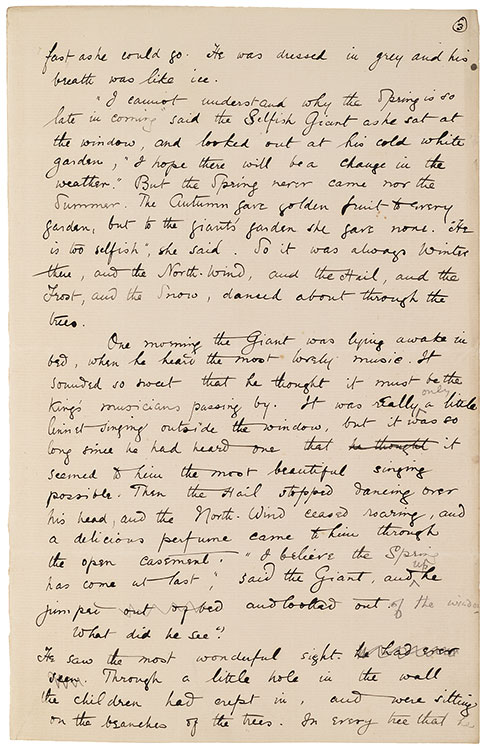
"The Selfish Giant."
Manuscript in the hand of Constance Wilde, signed by Oscar Wilde, ca. 1888. 8 p., including cover sheet
Gift of Lucia Moreira Salles, 2008
Page 4
(3)
fast as he could go. He was dressed in grey, and his breath was like ice.
"I cannot understand why the Spring is so late in coming," said the Selfish Giant, as he sat at the window and looked out at his cold, white garden; "I hope there will be a change in the weather."
But the Spring never came, nor the Summer. The Autumn gave golden fruit to every garden, but to the Giant's garden she gave none. "He is too selfish," she said. So it was always Winter there, and the North Wind and the Hail, and the Frost, and the Snow danced about through the trees.
One morning the Giant was lying awake in bed when he heard the most9 lovely music. It sounded so sweet10 that he thought it must be the King's musicians passing by. It was really only a little linnet singing outside the11 window, but it was so long since he had heard one12 that it seemed to him the most beautiful singing possible.13 Then the Hail stopped dancing over his head, and the North Wind ceased roaring, and a delicious perfume came to him through the open casement. "I believe the Spring has come at last," said the Giant; up he jumped and looked out of the window.14
What did he see?
He saw a most wonderful sight. Through a little hole in the wall the children had crept in, and were sitting on15 the branches of the trees. In every tree that he
9For publication, "the most" was changed to "some."
10For publication, "to his ears" was added here.
11For publication, "the" was changed to "his."
12For publication, "one" was changed to "a bird sing in his garden."
13For publication, the most beautiful singing possible" was changed to "to be the most beautiful music in the world."
14For publication, "the window" was changed to "bed and looked out."
15For publication, "were sitting on" was changed to "they were sitting in."
"The Selfish Giant", page 5
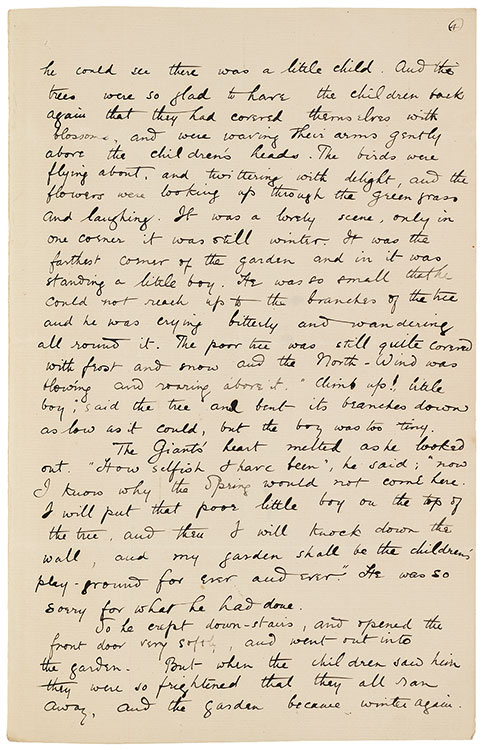
"The Selfish Giant."
Manuscript in the hand of Constance Wilde, signed by Oscar Wilde, ca. 1888. 8 p., including cover sheet
Gift of Lucia Moreira Salles, 2008
Page 5
(4)
he could see there was a little child. And the trees were so glad to have the children back again that they had covered themselves with blossoms, and were waving their arms gently above the children's heads. The birds were flying about and twittering with delight, and the flowers were looking up through the green grass and laughing. It was a lovely scene, only in one corner it was still winter. It was the farthest corner of the garden, and in it was standing a little boy. He was so small that he could not reach up to the branches of the tree, and he was crying bitterly and wandering all round it.16 The poor tree was still quite17 covered with frost and snow, and the North Wind was blowing and roaring above it. "Climb up! little boy," said the Tree, and18 bent its branches down as low as it could; but the boy was too tiny.
The Giant's19 heart melted as he looked out. "How selfish I have been!" he said; "now I know why the Spring would not come here. I will put that poor little boy on the top of the tree, and then I will knock down the wall, and my garden shall be the children's playground for ever and ever." He was so20 sorry for what he had done.
So he crept downstairs and opened the front door very21 softly, and went out into the garden. But when the children saw him they were so frightened that they all ran away, and the garden became winter again.
16For publication, "he was crying bitterly and wandering all round it" was changed to "he was wandering all round it, crying bitterly."
17For publication, the word "quite" was deleted.
18For publication, the word "it" was added here.
19For publication, "The Giant's" was changed to "And the Giant's."
20For publication, "so" was changed to "really very."
21For publication, "very" was changed to "quite."
"The Selfish Giant", page 6
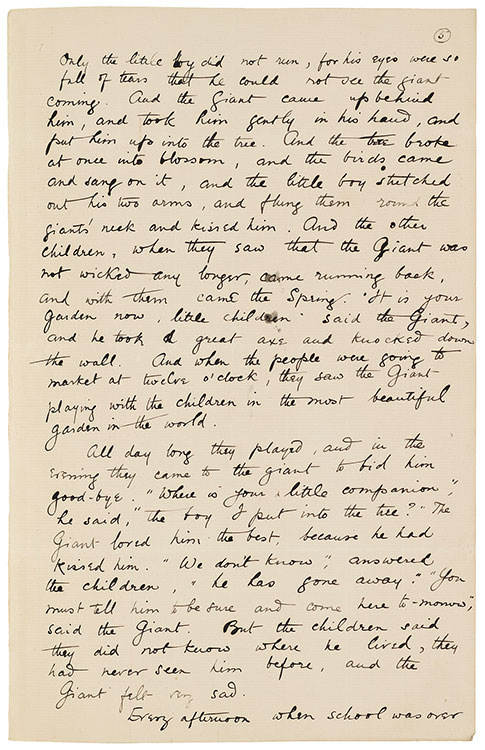
"The Selfish Giant."
Manuscript in the hand of Constance Wilde, signed by Oscar Wilde, ca. 1888. 8 p., including cover sheet
Gift of Lucia Moreira Salles, 2008
Page 6
Only the little boy did not run, for his eyes were so full of tears that he could22 not see the Giant coming. And the Giant came23 up behind him and took him gently in his hand, and put him up into the tree. And the tree broke at once into blossom, and the birds came and sang on it, and the little boy stretched out his two arms and flung them round the Giant's neck, and kissed him. And the other children when they saw that the Giant was not wicked any longer, came running back, and with them came the Spring. "It is your garden now, little children," said the Giant, and he took a great axe and knocked down the wall. And when the people were going to market at twelve o'clock they saw24 the Giant playing with the children in the most beautiful garden in the world.25
All day long they played, and in the evening they came to the Giant to bid him good-bye.
"But where is your little companion?" he said: "the boy I put into the tree." The Giant loved him the best because he had kissed him.
"We don't know," answered the children: "he has gone away."
"You must tell him to be sure and come here26 to-morrow," said the Giant. But the children said that they did not know where he lived, they27 had never seen him before; and the Giant felt very sad.
Every afternoon when school was over
22For publication, "could" was changed to "did."
23For publication, "came" was changed to "stole."
24For publication, "saw" was changed to "found."
25For publication, "in the world" was changed to "they had ever seen."
26For publication, "here" was deleted.
26For publication, "they" was deleted.
"The Selfish Giant", page 7
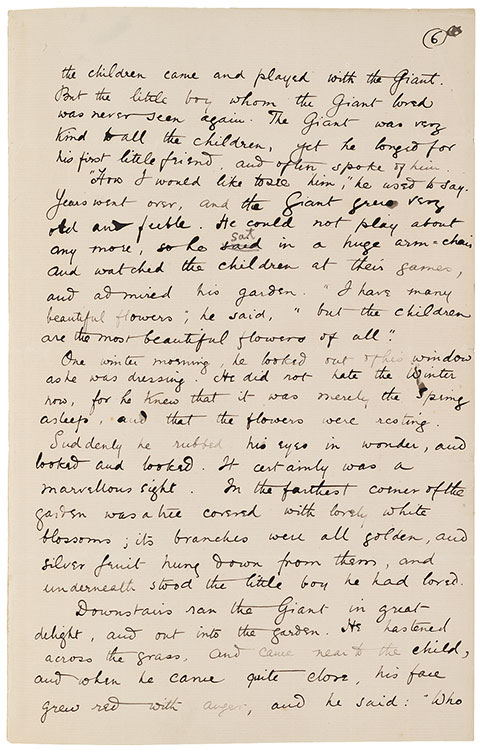
"The Selfish Giant."
Manuscript in the hand of Constance Wilde, signed by Oscar Wilde, ca. 1888. 8 p., including cover sheet
Gift of Lucia Moreira Salles, 2008
Page 7
(6)
the children came and played with the Giant. But the little boy whom the Giant loved was never seen again. The Giant was very kind to all the children, yet he longed for his first little friend, and often spoke of him. "How I would like to see him!" he used to say.
Years went over, and the Giant grew very old and feeble. He could not play about any more, so he sat in a huge arm-chair, and watched the children at their games, and admired his garden. "I have many beautiful flowers," he said; "but the children are the most beautiful flowers of all."
One winter morning he looked out of his window as he was dressing. He did not hate the Winter now, for he knew that it was merely the Spring asleep, and that the flowers were resting.
Suddenly he rubbed his eyes in wonder and looked and looked. It certainly was a marvellous sight. In the farthest corner of the garden was a tree27 covered with lovely white blossoms. Its branches were28 golden, and silver fruit hung down from them, and underneath29 stood the little boy he had loved.
Downstairs ran the Giant in great delight,30 and out into the garden. He hastened across the grass, and came near to the child. And when he came quite close his face grew red with anger, and he said, "Who
27For publication, the word "quite" was inserted here.
28For publication, the word "all" was inserted here.
29For publication, the word "it" was inserted here.
30For publication, "delight" was changed to "joy."
"The Selfish Giant", page 8
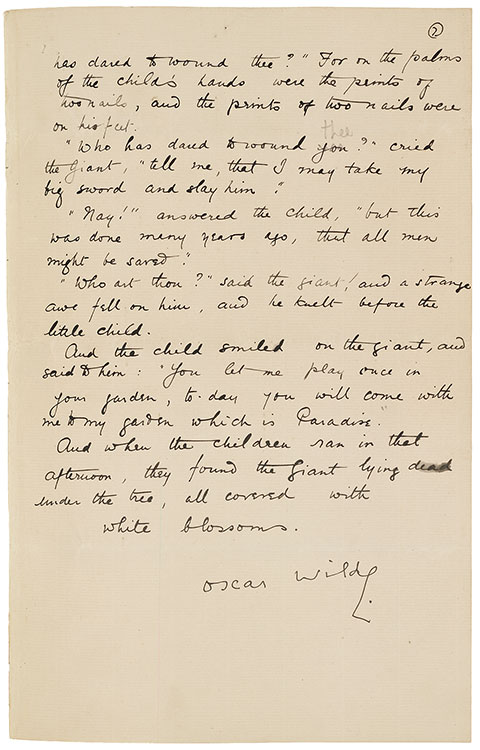
"The Selfish Giant."
Manuscript in the hand of Constance Wilde, signed by Oscar Wilde, ca. 1888. 8 p., including cover sheet
Gift of Lucia Moreira Salles, 2008
Page 8
(7)
has31 dared to wound thee?" For on the palms of the child's hands were the prints of two nails, and the prints of two nails were on his32 feet.
"Who has31 dared to wound you? "33 cried the Giant; "tell me, that I may take my big sword and slay him."
"Nay!" answered the child: "but this was done many years ago, that all men might be saved." 34
"Who art thou?" said the Giant, and a strange awe fell on him, and he knelt before the little child.
And the child smiled on the Giant, and said to him, "You let me play once in your garden, to-day you will35 come with me to my garden, which is Paradise."
And when the children ran in that afternoon, they found the Giant lying dead under the tree, all covered with white blossoms.
Oscar Wilde
31For publication, "has" was changed to "hath."
32For publication, "his" was changed to "the little."
33For publication, "you" was changed to "thee."
34For publication, "this was done many years ago, that all men might be saved" was changed to "these are the wounds of Love."
35For publication, "will" was changed to "shall."
"Under the Balcony", page 1
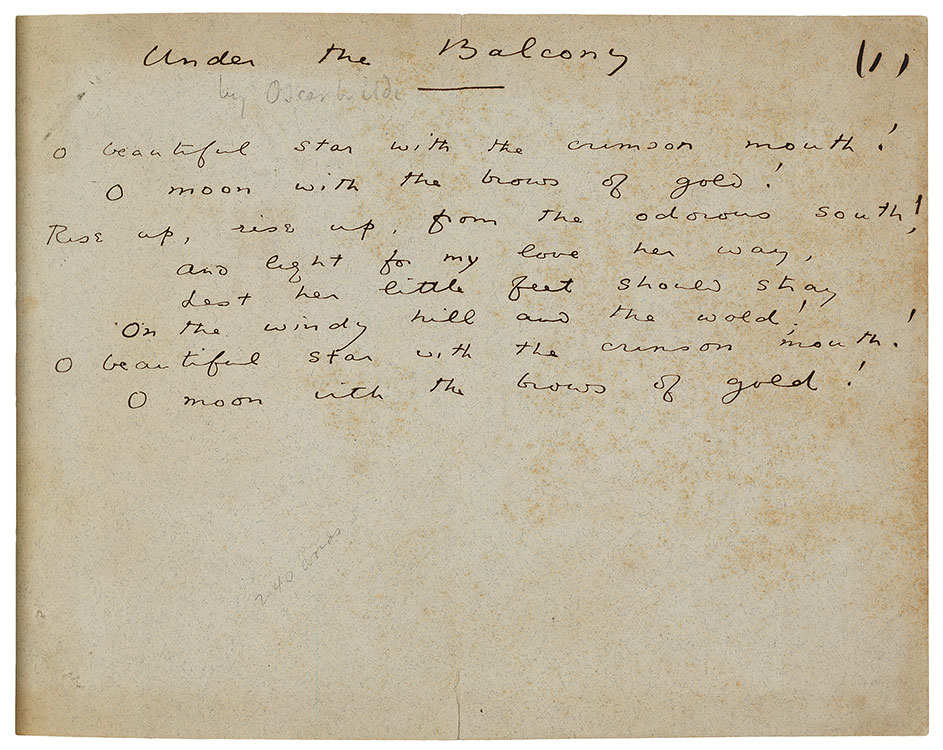
"Under the Balcony." Autograph manuscript signed, ca. 1884. 4 p.
Autograph manuscript signed, ca. 1884. 4 p.
Gift of Lucia Moreira Salles, 2008
Page 1r
(1)
Under the Balcony
[in another hand:] by Oscar Wilde
O beautiful star with the crimson mouth!
O moon with the brows of gold!
Rise up, rise up, from the odorous south!
And light for my love her way,
Lest her little feet should stray
On the windy hill and the wold!
O beautiful star with the crimson mouth!
O moon with the brows of gold!
"Under the Balcony", page 2
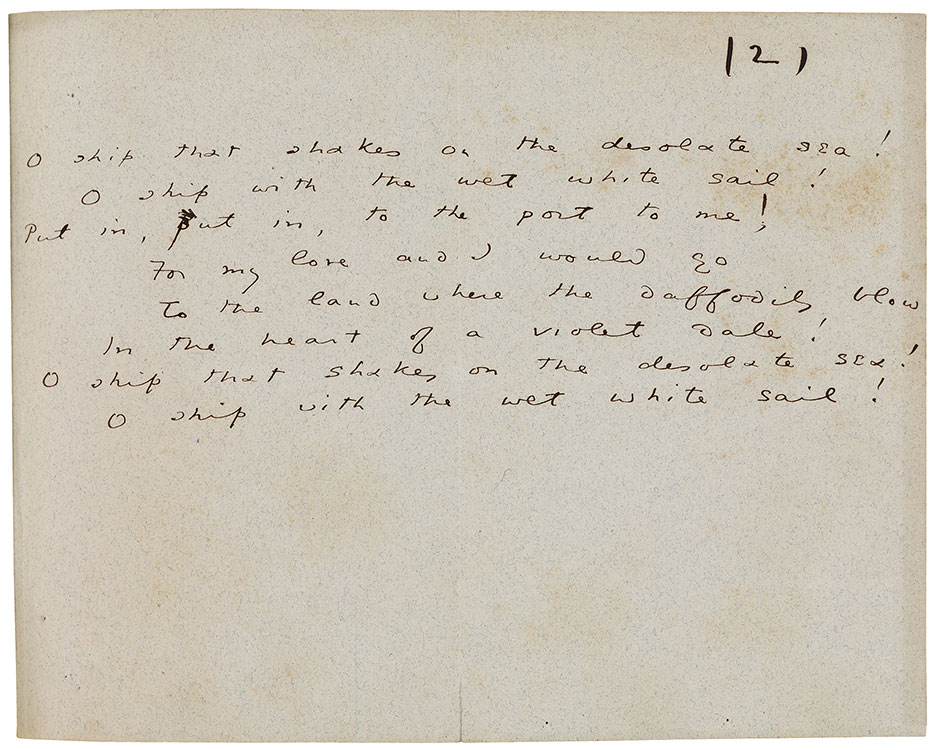
"Under the Balcony." Autograph manuscript signed, ca. 1884. 4 p.
Autograph manuscript signed, ca. 1884. 4 p.
Gift of Lucia Moreira Salles, 2008
Page 2
(2)
O ship that shakes on the desolate sea!
O ship with the wet white sail!
Put in, put in, to the port to me!
For my love and I would go
To the land where the daffodils blow
In the heart of a violet dale!
O ship that shakes on the desolate sea!
O ship with the wet white sail!
"Under the Balcony", page 3
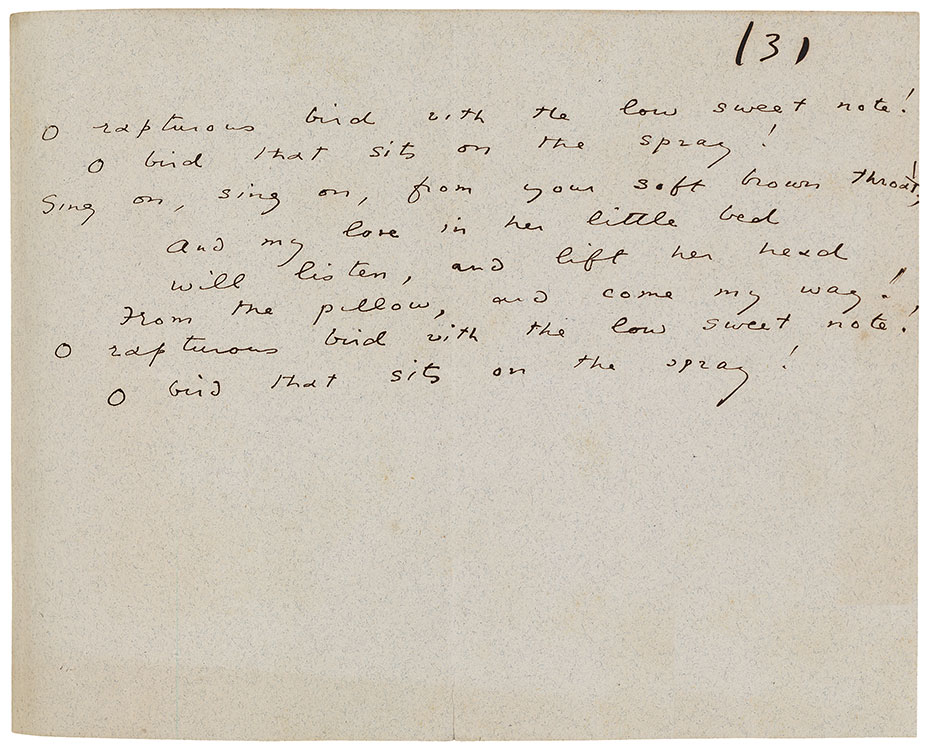
"Under the Balcony." Autograph manuscript signed, ca. 1884. 4 p.
Autograph manuscript signed, ca. 1884. 4 p.
Gift of Lucia Moreira Salles, 2008
"Under the Balcony."
Autograph manuscript signed, ca. 1884. 4 p.
Accession number: MA 7258.8
Page 3
(3)
O rapturous bird with the low sweet note!
O bird that sits on the spray!
Sing on, sing on, from your soft brown throat!
And my love in her little bed
Will listen, and lift her head
From the pillow, and come my way!
O rapturous bird with the low sweet note!
O bird that sits on the spray!
"Under the Balcony", page 4
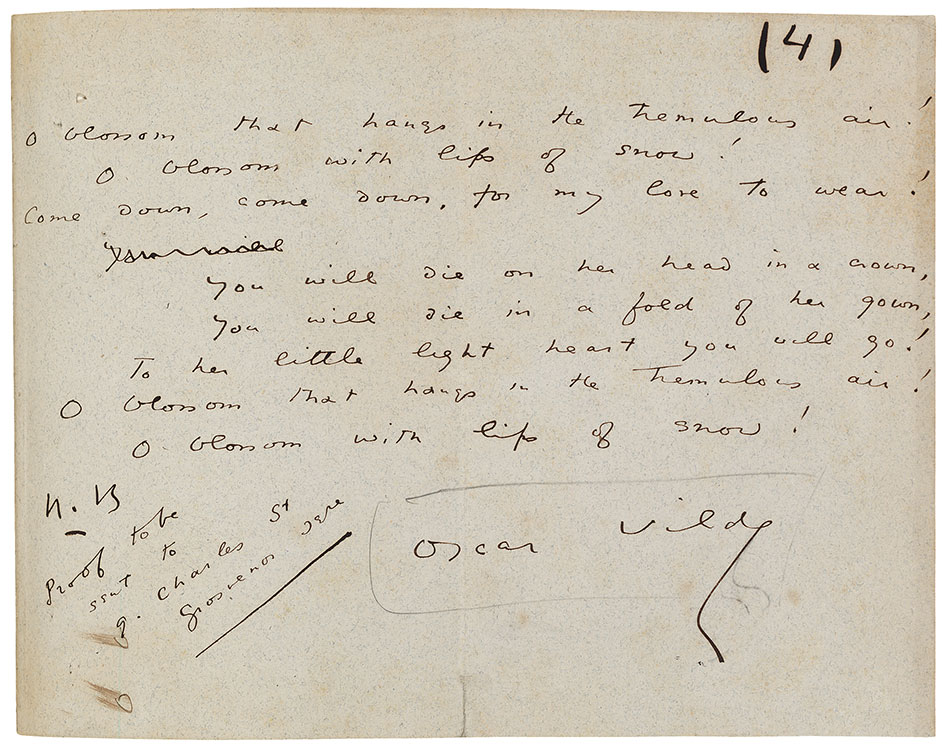
"Under the Balcony." Autograph manuscript signed, ca. 1884. 4 p.
Autograph manuscript signed, ca. 1884. 4 p.
Gift of Lucia Moreira Salles, 2008
Page 4
(4)
O blossom that hangs in the tremulous air!
O blossom with lips of snow!
Come down, come down, for my love to wear!
You will
You will die on her head in a crown,
You will die in a fold of her gown,
To her little light heart you will go!
O blossom that hangs in the tremulous air!
O blossom with lips of snow!
Oscar Wilde
N.B. Proof to be sent to 9 Charles St
Grosvenor Sqre.
Clegg Letter, page 1
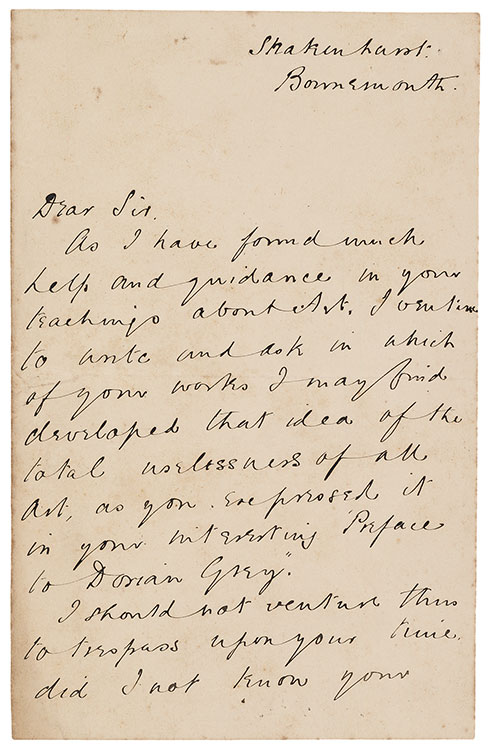
Ernest Bernulf Clegg. Autograph letter signed, dated Strakenhurst, Bournemouth, to Oscar Wilde, [April 1891]. 2 p.
Gift of Lucia Moreira Salles, 2008
Page 1
Shakenhurst
Bournemouth
Dear Sir
As I have found much help and guidance in your teachings about Art, I venture to write and ask in which of your works I may find developed that idea of the total uselessness of all Art, as you expressed it in your interesting 'Preface to Dorian Grey.'
I should not venture thus to trespass upon your time did I not know your
Clegg Letter, page 2
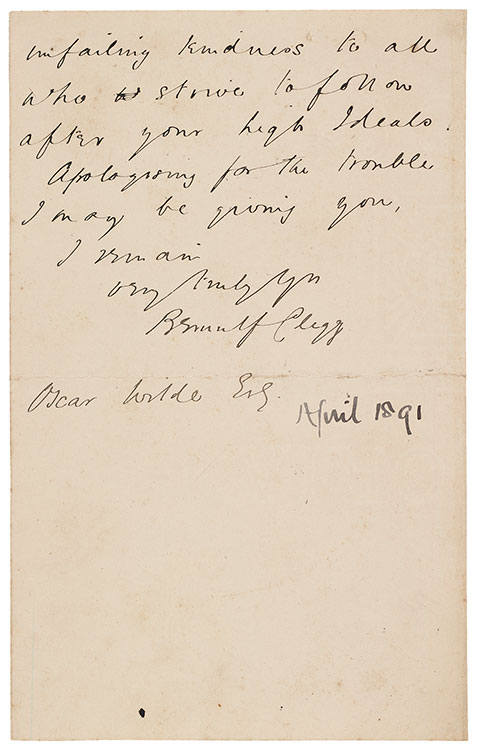
Ernest Bernulf Clegg. Autograph letter signed, dated Strakenhurst, Bournemouth, to Oscar Wilde, [April 1891]. 2 p.
Gift of Lucia Moreira Salles, 2008
Page 2
unfailing kindness to all who w strive to follow after your high Ideals.
Apologising for the trouble I may be giving you,
I remain
very truly yrs
Bernulf Clegg
Oscar Wilde Esq.
[in another hand:] April 1891
Letter to Clegg, page 1
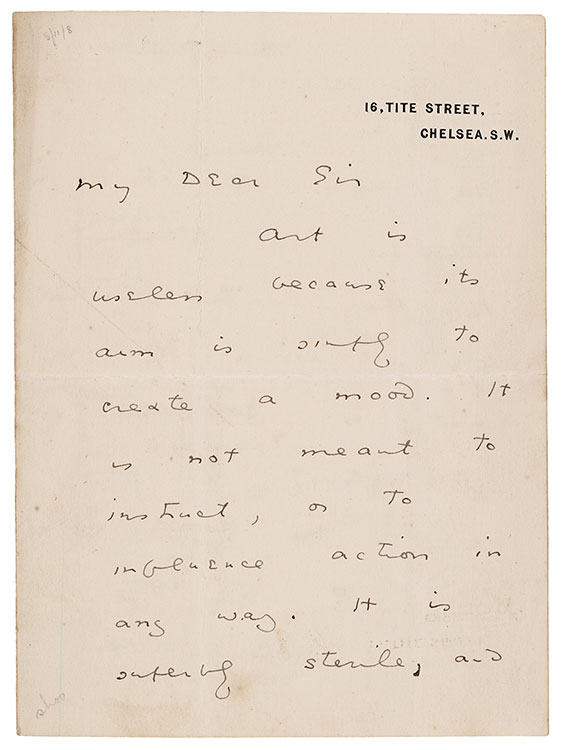
Autograph letter signed, London, to Bernulf Clegg, [1891]. 4 p.
Gift of Lucia Moreira Salles, 2008
Page 1
16, Tite Street,
Chelsea. S.W.
My dear Sir
Art is useless because its aim is simply to create a mood. It is not meant to instruct, or to influence action in any way. It is superbly sterile, and
Letter to Clegg, pages 2–3
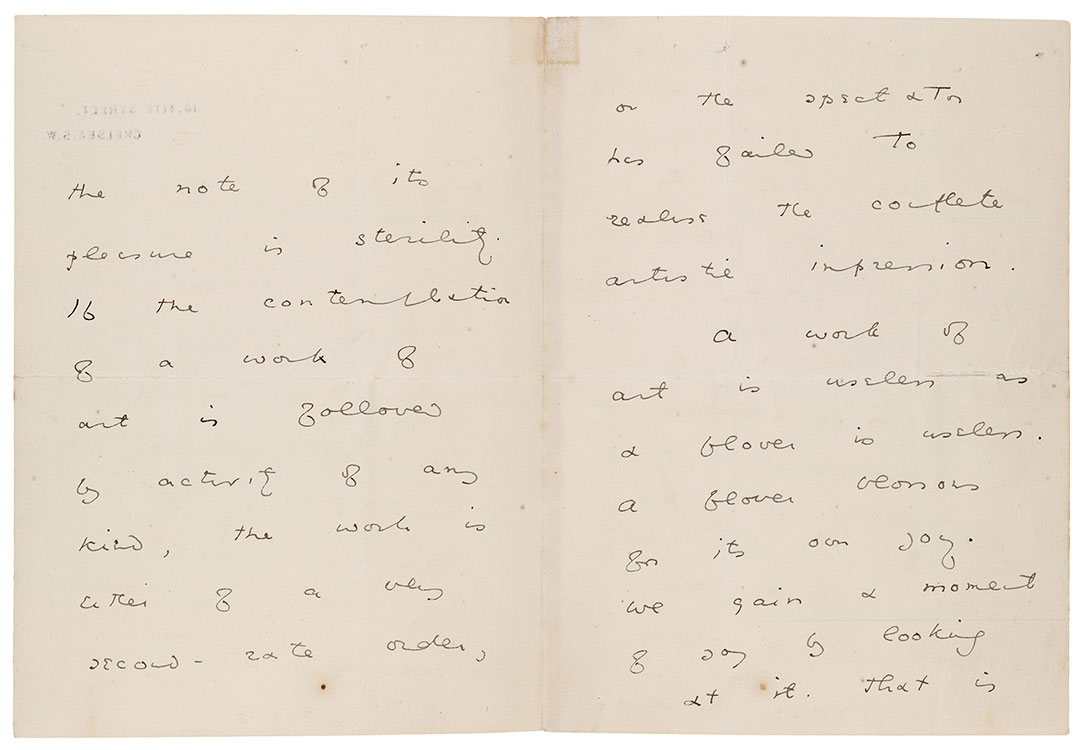
Autograph letter signed, London, to Bernulf Clegg, [1891]. 4 p.
Gift of Lucia Moreira Salles, 2008
Pages 2-3
the note of its pleasure is sterility. If the contemplation of a work of art is followed by activity of any kind, the work is either of a very second-rate order, or the spectator has failed to realise the complete artistic impression.
A work of art is useless as a flower is useless. A flower blossoms for its own joy. We gain a moment of joy by looking at it. That is
Letter to Clegg, page 4
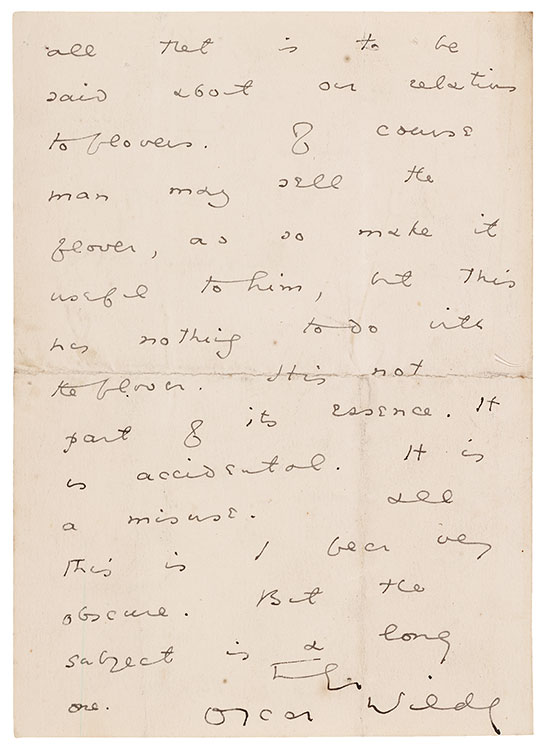
Autograph letter signed, London, to Bernulf Clegg, [1891]. 4 p.
Gift of Lucia Moreira Salles, 2008
Page 4
all that is to be said about our relations to flowers. Of course man may sell the flower, and so make it useful to him, but this has nothing to do with the flower. It is not part of its essence. It is accidental. It is a misuse. All this is I fear very obscure. But the subject is a long one.
Truly yours,
Oscar Wilde
Letter to Bosie, page 1
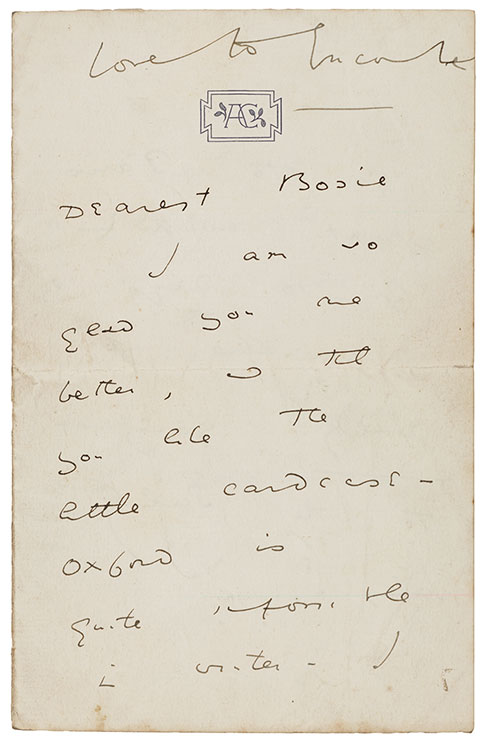
Autograph letter signed, to "Bosie" [Lord Alfred Douglas], ca. Nov. 1892. 4 p.
Gift of Lucia Moreira Salles, 2008
Page 1
Love to Encombe
A[lbemarle] C[lub]
Dearest Bosie
I am so glad you are better, and that you like the little cardcase—Oxford is quite impossible in winter. I
Letter to Bosie, pages 2–3
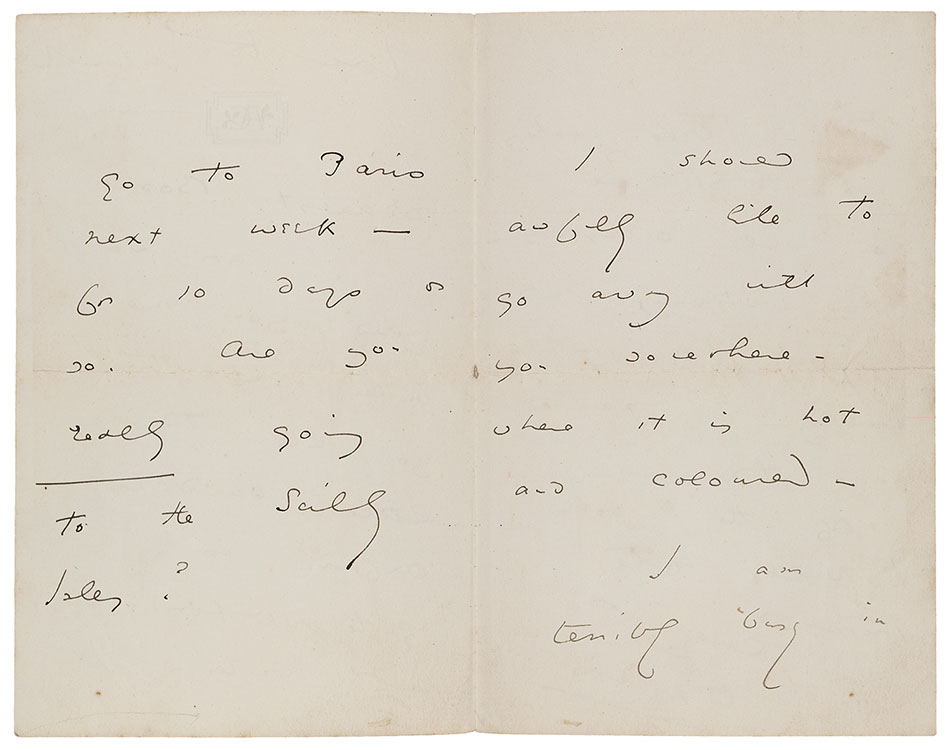
Autograph letter signed, to "Bosie" [Lord Alfred Douglas], ca. Nov. 1892. 4 p.
Gift of Lucia Moreira Salles, 2008
Pages 2–3
go to Paris next week—for 10 days or so. Are you really going to the Scilly Isles?
I should awfully like to go away with you somewhere—where it is hot and coloured—
I am terribly busy in
Letter to Bosie, page 4
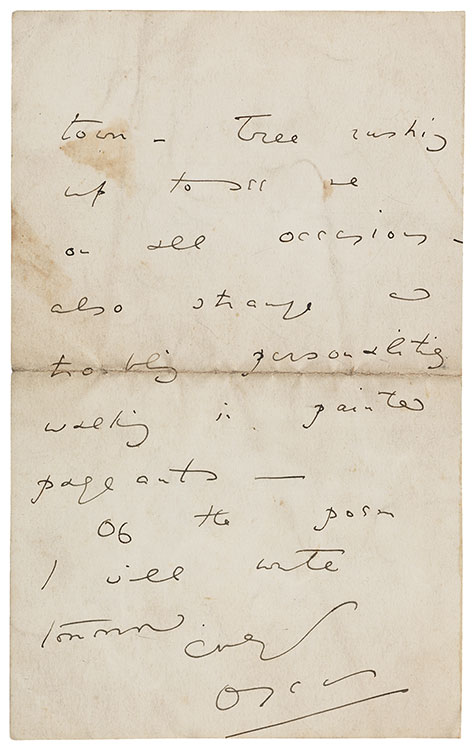
Autograph letter signed, to "Bosie" [Lord Alfred Douglas], ca. Nov. 1892. 4 p.
Gift of Lucia Moreira Salles, 2008
Page 4
town—Tree rushing up to see me on all occasions—also strange and troubling personalities walking in painted pageants—
Of the poem I will write tomorrow.
Ever yours
Oscar
"La dame jaune"
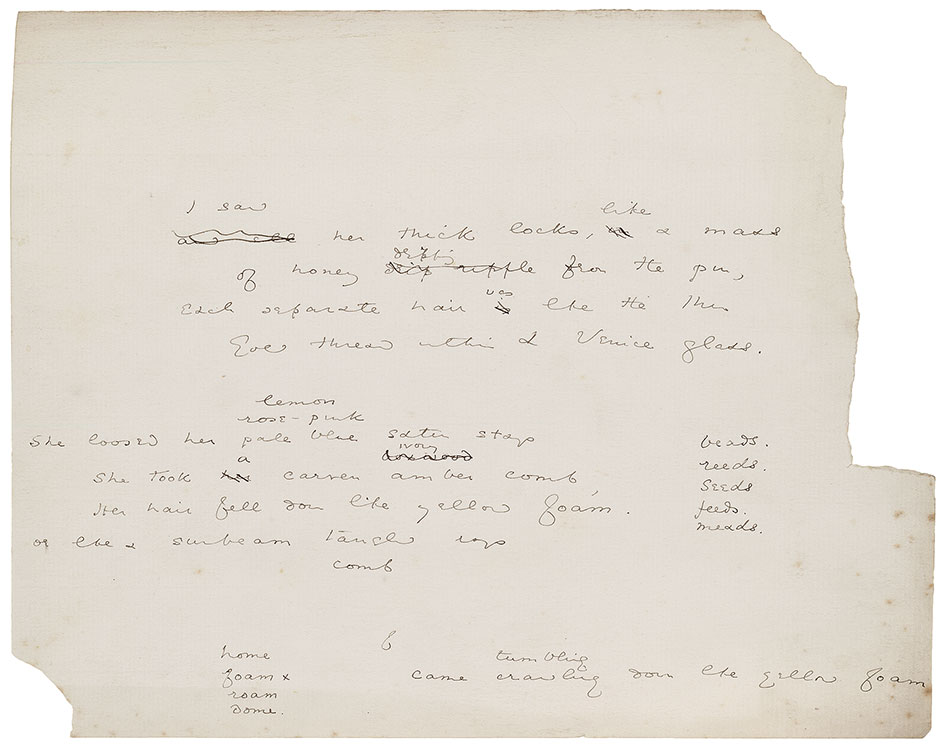
"La dame jaune." Autograph manuscript, ca. 1889? 1 p.
Gift of Lucia Moreira Salles, 2008
and all I saw her thick locks, in like a mass
of honey drip ripple dripping from the pin,
Each separate hair is was like the thin
Gold thread within a Venice glass.
She loosed her pale blue/rose-pink/lemon satin stays
She took her a carven amber/ boxwood/ivory comb,
Her hair fell down like yellow foam.
or like a sunbeam tangled rays
comb
beads.
reeds.
seeds.
feeds.
meads.
home
foam x came crawling/tumbling down like yellow foam
roam
dome.
Letter to Kersley, page 1
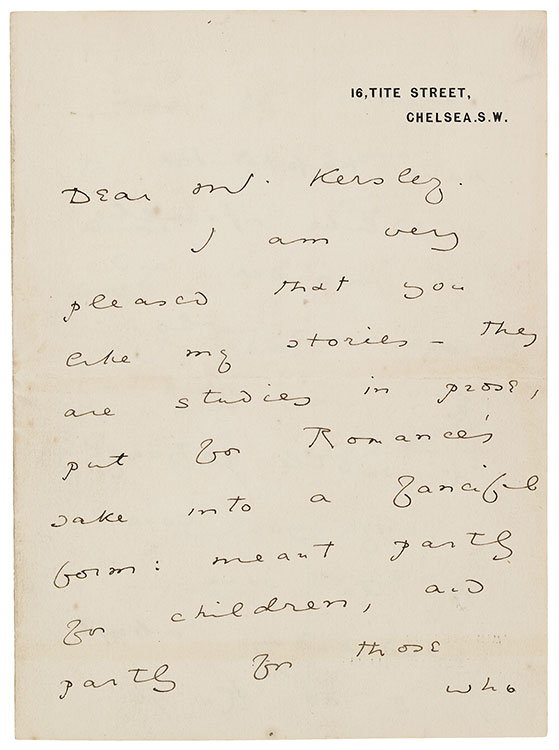
Autograph letter signed, dated London, to George Kersley, postmarked 1888 June 15. 3 p., with envelope
Gift of Lucia Moreira Salles, 2008
Page 1
16, Tite Street,
Chelsea. S.W.
Dear Mr Kersley,
I am very pleased that you like my stories—they are studies in prose, put for Romance's sake into a fanciful form: meant partly for children, and partly for those who
Letter to Kersley, pages 2–3
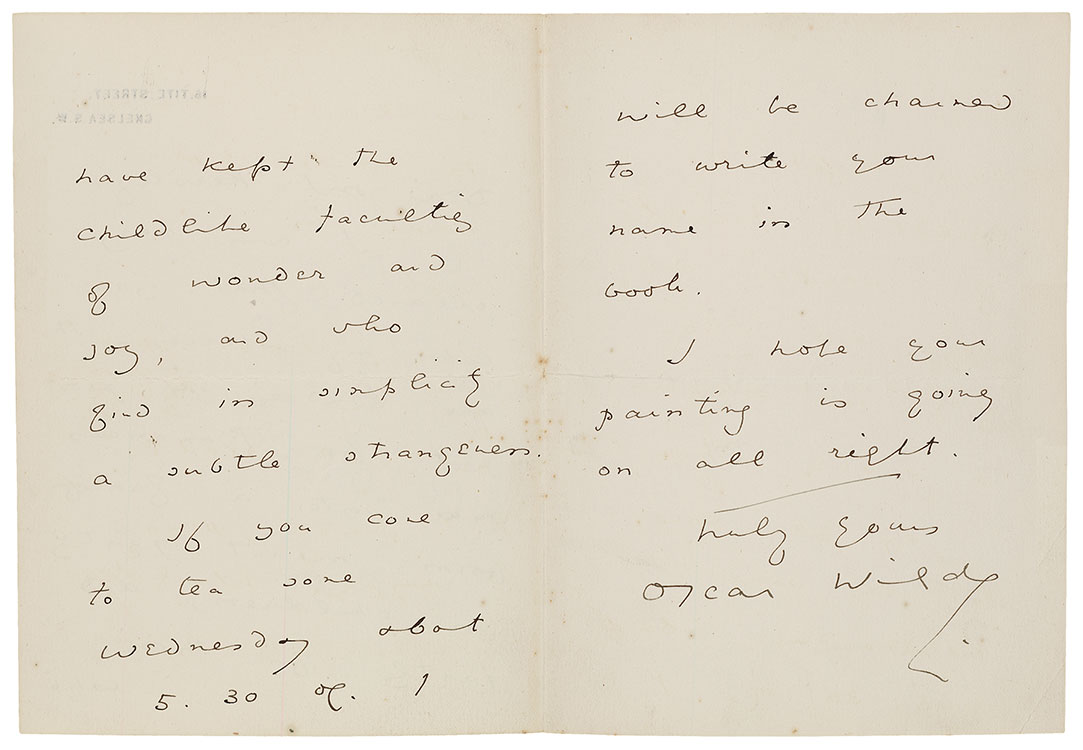
Autograph letter signed, dated London, to George Kersley, postmarked 1888 June 15. 3 p., with envelope
Gift of Lucia Moreira Salles, 2008
Pages 2–3
have kept the childlike faculties of wonder and joy, and who find in simplicity a subtle strangeness.
If you come to tea some Wednesday about 5.30 o[']c[lock]. I will be charmed to write your name in the book.
I hope your painting is going on all right.
Truly yours
Oscar Wilde
[envelope]
George Herbert Kersley Esq.
16 Honor Road
West Kensington
Letter to Lane, page 1
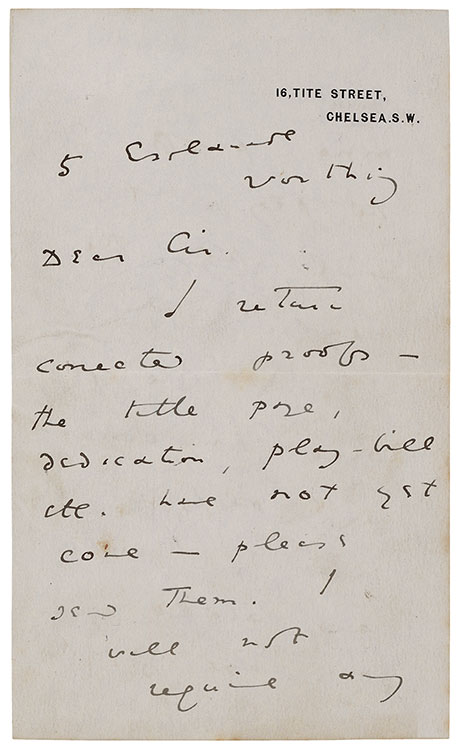
Autograph letter signed, dated Worthing, to publisher John Lane, [August 1894]. 8 p.
Accession number: MA 7258.14
Gift of Lucia Moreira Salles, 2008
Page 1
[printed letterhead:]
16, Tite Street,
Chelsea. S.W.
[handwritten address:]
5 Esplanade
Worthing
Dear Sir
I return corrected proofs—the title page, dedication, play-bill etc. have not yet come—please send them. I will not require any
Letter to Lane, pages 2–3
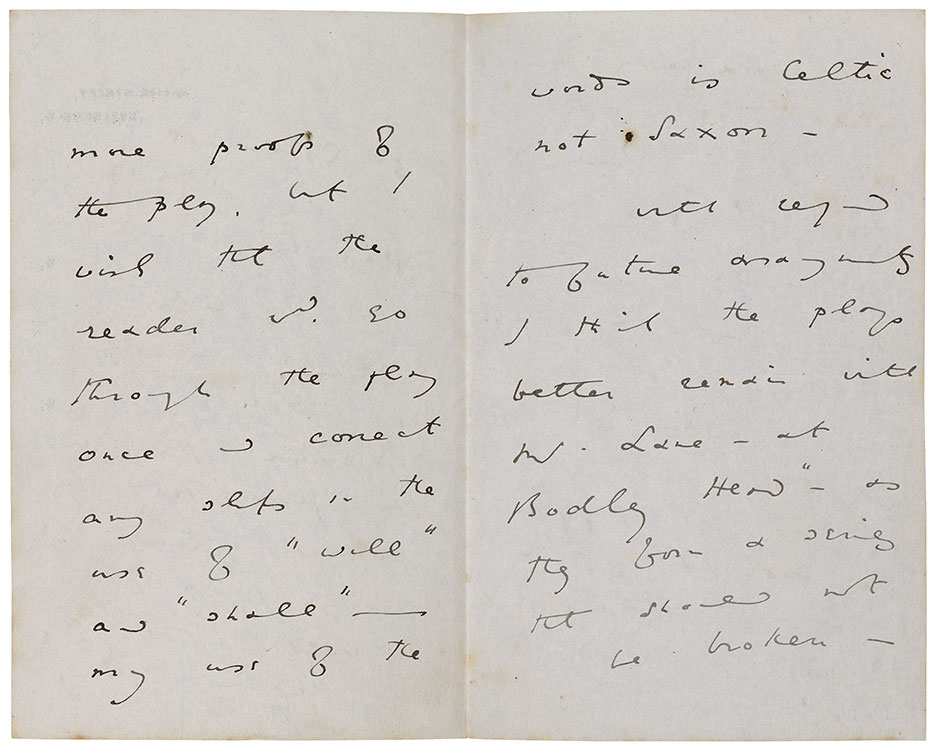
Autograph letter signed, dated Worthing, to publisher John Lane, [August 1894]. 8 p.
Gift of Lucia Moreira Salles, 2008
Pages 2-3
more proofs of the play, but I wish that the reader w[oul]d. go through the play once and correct any slips in the use of "will" and "shall"—my use of the words is Celtic not Saxon.
With regard to future arrangements I think the plays better remain with Mr. Lane—at Bodley Head—as they form a series that should not be broken—
Letter to Lane, page 4
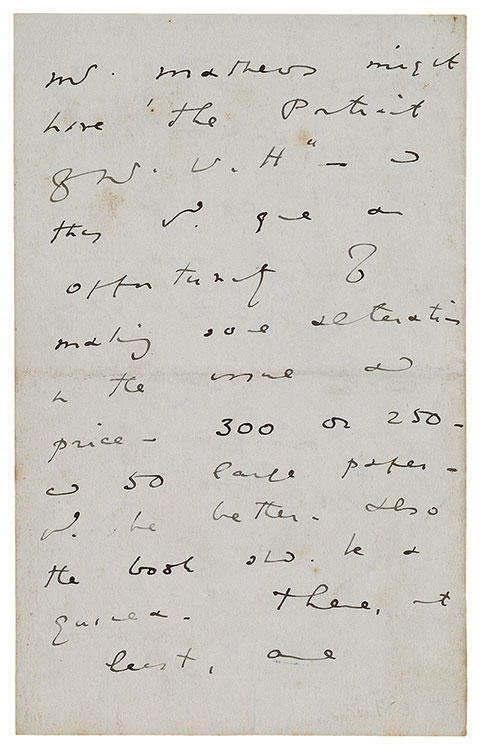
Autograph letter signed, dated Worthing, to publisher John Lane, [August 1894]. 8 p.
Gift of Lucia Moreira Salles, 2008
Page 4
Mr. Mathews might have "The Portrait of Mr. W.H."—and this w[oul]d. give an opportunity of making some alterations in the issue and price—300 or 250—and 50 large paper w[oul]d. be better. Also the book sh[oul]d. be a guinea. These, at least, are
Letter to Lane, page 5
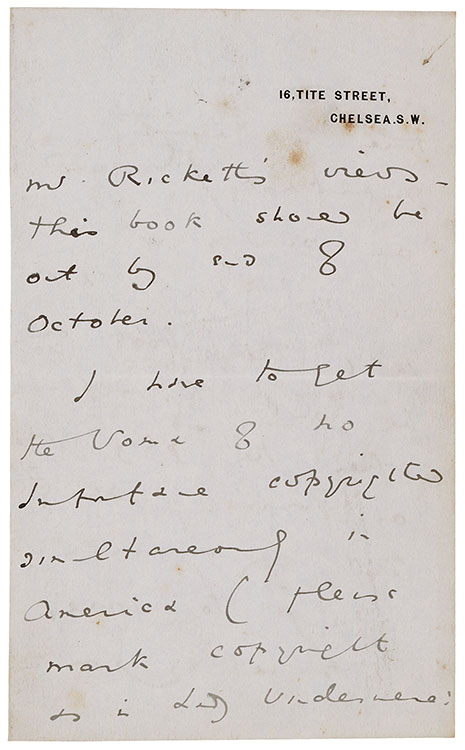
Autograph letter signed, dated Worthing, to publisher John Lane, [August 1894]. 8 p.
Gift of Lucia Moreira Salles, 2008
Page 5
Mr. Ricketts' views. This book should be out by end of October.
I have to get the Woman of No Importance copyrighted simultaneously in America (please mark copyright as in Lady Windermere:
Letter to Lane, pages 6–7
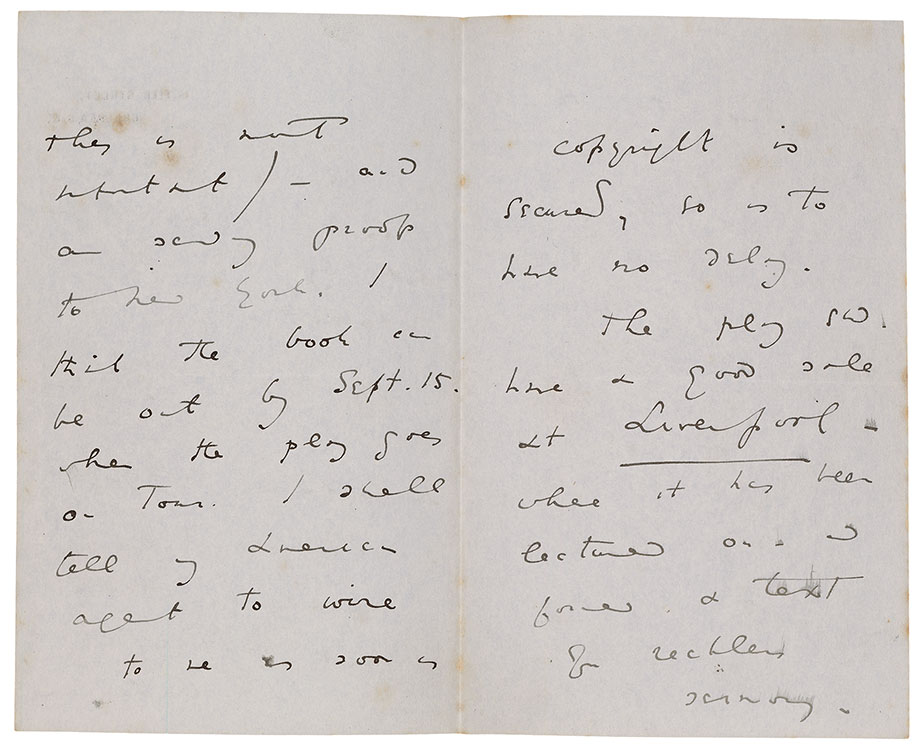
Autograph letter signed, dated Worthing, to publisher John Lane, [August 1894]. 8 p.
Gift of Lucia Moreira Salles, 2008
Page 6-7
this is most important) –and am sending proofs to New York. I think the book can be out by Sept. 15. when the play goes on tour. I shall tell my American agent to wire to me as soon as copyright is secured, so as to have no delay.
The play sh[oul]d. have a good sale at Liverpool—where it has been lectured on, and formed a text for reckless sermons.
Letter to Lane, page 8
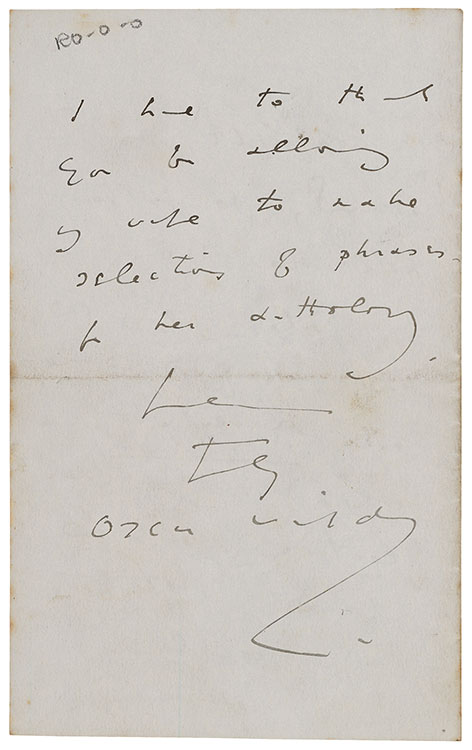
Autograph letter signed, dated Worthing, to publisher John Lane, [August 1894]. 8 p.
Gift of Lucia Moreira Salles, 2008
Page 8
I have to thank you for allowing my wife to make selections of phrases for her anthology.
I remain truly
Oscar Wilde